

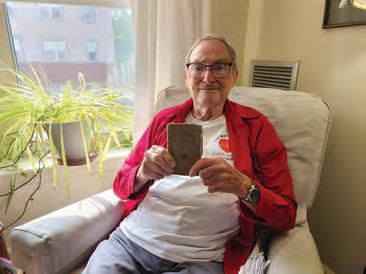
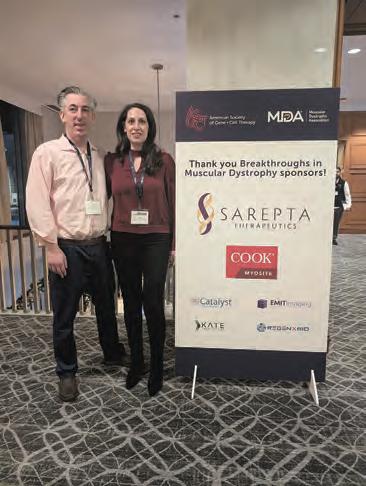
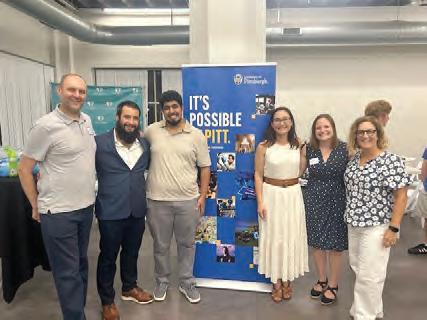







By David Rullo | Senior Sta Writer
Levi (a pseudonym, for security reasons) recalled an argument in the shelter where he and his peers sought safety on a regular basis when alarms warned that Iranian missiles were entering Israeli air space.
“Someone got a nosebleed and needed to use the bathroom,” Levi said. “The madricha who was present did not let her exit at first, which sparked a small argument.”
Emotions ran high inside the packed building, which was hot and had very little air flow.
“It was usually tense,” Levi remembered. “Everyone was sleep deprived.”
Levi, a rising junior at the University of Pittsburgh majoring in mechanical engineering, had been in the Jewish state since May 12, first with Birthright Israel and then with the Birthright Israel Onward program, an internship opportunity for young adults who spend six to 10 weeks in Israel to live, work and study. The program is administered locally by Hillel Jewish University Center of Pittsburgh, in partnership with the Jewish Federation of Greater Pittsburgh.
In the early days of the war, Levi said, tension was exacerbated by the uncertainty of the situation.
“The main thing was not knowing what was going to happen,” he said. “A siren would go off at 3 or 4 a.m. We were just waiting for it to happen. It was not fun because we weren’t able to live our lives. We lived in a state of, ‘What’s the next hour going to bring?’”
The most amount of time he spent in a safe room was about an hour, he said, calling the experience “stress inducing.”
“We sometimes heard explosions overhead,” he said. “One friend who was outside during one of the sirens saw a missile being intercepted. Luckily, none landed very close to us.”
Eventually, the group began using a parking garage for shelter, which Levi said was preferable because it was more spacious and better ventilated.
“We brought cards and even a soccer ball, so we managed to entertain ourselves,” he said.
Levi is now back in the United States. His trip was cut short and the Birthright Israel Onward group was evacuated.
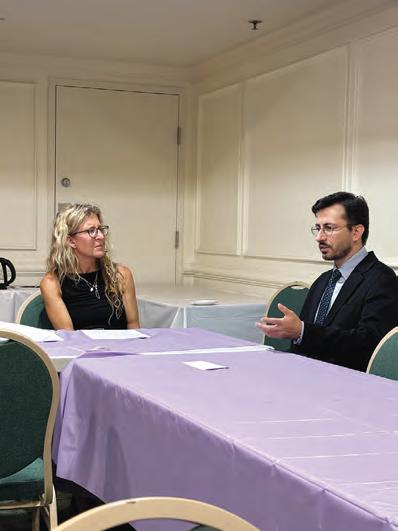
By Toby Tabachnick | Editor
Mohamad Machine-Chian knows firsthand the perils and risks of being a journalist in Iran.
Machine-Chian, now a senior researcher at the Center for Governance and Markets at the University of Pittsburgh — which is supported by the Pittsburgh Network for Threatened Scholars —is one of the architects of liberal reforms in Iran. A journalist as well as a scholar, his prolific writings challenge the post-revolution economy of the Islamic Republic.
While he is not connected to Iran’s reformist political parties, he identifies as a “reformer.”
That doesn’t sit well with the government of the Islamic Republic.
“Iran is probably one of the worst places to be a journalist or a critic in general,”



By Andrew Rich | Staff Writer
When news that the 2025 Maccabiah Games in Israel were canceled because of the Israel/Iran conflict, disappointment set in for the athletes who were scheduled to compete — including some young Pittsburghers who were gearing up for their first Maccabiah Games experience.
The games, commonly referred to as the “Jewish Olympics,” are held every four years in Israel and are second only to the Olympics in terms of the number of athletes participating.
The 22nd Maccabiah Games were set to begin July 8 and run through July 22. This year’s games would have been the largest in Maccabiah’s history with over 8,000 Jewish athletes from 55 countries competing in 45 different sports.
Pittsburghers Maya Gelman and Grayson Honig were excited to make the journey to Israel for the games, playing for Team USA.
Honig, 20, is a field hockey player from Shadyside who plays Division III field hockey for the University of Rochester. She began playing field hockey in seventh grade at The Ellis School.

With athleticism running in her family, her field hockey success was no surprise.
“It’s been a great thing for me to just release energy and keep my mind clear, and I’ve always just liked being active,” said Honig, who was also a competitive skier and played soccer.
Members of the field hockey team were given a running packet to follow in order to prepare for the Maccabiah Games. Training is crucial for Honig.
Grayson Honig in Team

said. “It really teaches you the effect of mentality on the way you play … and how you can affect other people around you.”
She started playing volleyball in eighth grade with the encouragement of her
because I have a lot of friends and family in Israel,” she said.
The qualifying process varies depending on the sport, but for Maya Gelman it began with an athletic resume and application. Following that, she submitted a highlight reel for the coaches to examine. The selection process for volleyball was based primarily on the highlight reel and an interview.
With the cancellation of the Maccabiah Games, Maya Gelman is occupying her summer at Emma Kaufmann Camp, where she is a counselor. She was scheduled to leave camp early to go to Israel, but now she will finish out the summer at EKC.
Honig, a data science major, is looking for different internship and work opportunities in Pittsburgh now that her summer is open. Although she was disappointed the games were canceled, “I completely understood,” Honig said.
Both athletes expressed their commitment to playing in the rescheduled games in 2026.
“I definitely plan on playing next year,” Maya Gelman said.
“That was a super fun way to all be together and get to know each other … and play together,” Honig said.
Playing together before the tournament was a privilege not available to every team heading to the Maccabiah Games. Aside from one Zoom call, Gelman never met the majority of her teammates, let alone play with them.
Gelman, 17, is a volleyball player going into her senior year at Mt. Lebanon High School.
“Volleyball is such a mental sport,” Gelman
The opportunity for her daughter to compete in Israel at the Maccabiah Games meant a lot to their family, Eva Gelman said.
“It was really important to us, and we thought it was a once in a lifetime opportunity, not only to represent Team USA on an international stage, but to connect with her Jewish identity,” Eva Gelman said.
This would have been the first time Maya Gelman had been to Israel since she was a child. “I was really excited to go,

SUBSCRIPTIONS
subscriptions@pittsburghjewishchronicle.org 412-687-1000, ext. 2
TO ADVERTISE advertising@pittsburghjewishchronicle.org 412-687-1000, ext. 1
EDITORIAL DEPARTMENT
Email: newsdesk@pittsburghjewishchronicle.org
BOARD OF TRUSTEES
Evan H. Stein, Chair
Evan Indianer, Vice Chair
Derek Smith, Treasurer
Gayle R. Kraut, Secretary
Gail Childs, Dan Droz, Malke Steinfeld Frank, Seth Glick, Tammy Hepps, Judith Kanal, Cátia Kossovsky, Charles Saul
GENERAL COUNSEL
Stuart R. Kaplan, Esq.
Jim Busis, CEO and Publisher 412-228-4690 jbusis@pittsburghjewishchronicle.org
EDITORIAL Toby Tabachnick, Editor 412-228-4577 ttabachnick@pittsburghjewishchronicle.org
Adam Reinherz, Senior Staff Writer 412-687-1000 areinherz@pittsburghjewishchronicle.org
David Rullo, Senior Staff Writer 412-687-1000 drullo@pittsburghjewishchronicle.org
Andrew Rich, Staff Writer arich@pittsburghjewishchronicle.org
ADVERTISING Amy Weiss, Account Executive (412) 613-0697 aweiss@pittsburghjewishchronicle.org
PRODUCTION
Jeni Mann Tough
Production Manager
Carl Weigel
Art/Production Coordinator
As a result of the canceled opening ceremony on July 10, Maccabi USA is encouraging all athletes to post a picture on Instagram while wearing their opening ceremony gear, and tag Maccabi USA in the photo.
Although the Maccabiah Games in Israel were canceled this year, Pittsburgh will play host to the regional JCC Maccabi Games in August. The JCC Maccabi Games is the largest Jewish youth event in the world and they are taking place from August 3-8 on the University of Pittsburgh campus. PJC
Andrew Rich can be reached at arich@ pittsburghjewishchronicle.org.
5915 Beacon St., 5th Floor Pittsburgh, PA 15217
Main phone number: 412-687-1000
Subscriptions: 412-687-1000, ext. 2
Subscriptions subscriptions@pittsburghjewishchronicle.org 412-687-1000, ext. 2
Published every Friday by the Pittsburgh Jewish Publication and Education Foundation 5915 Beacon St., 5th Floor Pittsburgh, PA 15217
Phone: 412-687-1000
POSTMASTER: Send address change to PITTSBURGH JEWISH CHRONICLE, 5915 BEACON ST., 5TH FLOOR PITTSBURGH, PA 15217 (PERIODICAL RATE POSTAGE PAID AT PITTSBURGH, PA AND AT ADDITIONAL MAILING OFFICES) USPS 582-740
Manuscripts, letters, documents and photographs sent to the Pittsburgh Jewish Chronicle become the property of this publication, which is not responsible for the return or loss of such items.
The Pittsburgh Jewish Chronicle does not endorse the goods or services advertised or covered in its pages and makes no representation to the kashrut of food products and services in said advertising or articles. The publisher is not liable for damages if, for any reason whatsoever, he fails to publish an advertisement or for any error in an advertisement. Acceptance of advertisers and of ad copy is subject to the publisher’s approval. The Pittsburgh Jewish Chronicle is not responsible if ads violate applicable laws and the advertiser will indemnify, hold harmless and defend the Pittsburgh Jewish Chronicle from all claims made by governmental agencies and consumers for any reason based on ads appearing in the Pittsburgh Jewish Chronicle

By Adam Reinherz | Senior Staff Writer
Lester Berkowitz isn’t sure what’s being planned for his 100th birthday. That’s all right — the Squirrel Hill resident is no stranger to secrets.
Speaking with the Chronicle from his home at Weinberg Terrace, the retiree, who seven years ago was recognized by the American Chemical Society for 70 years of membership, was mum about aspects of decades past.
What he did during World War II and in the preceding years, he’s happy to share; what followed, though, less so.
Berkowitz was born Sept. 30, 1925, at Carson C. Peck Memorial Hospital in Brooklyn and attended Erasmus Hall High School in the city’s Flatbush neighborhood.
According to the soon-to-be centenarian, the now-closed public school was founded about 10 years after the American Revolutionary War. Berkowitz said he used to joke that his former instructor “taught the first Latin class there in 1787.”
Ever studious and fiscally conscientious, Berkowitz realized higher education required academic excellence at Erasmus.
“I knew that if I wanted to go to college, my grades would have had to be good enough for me to get into City College where tuition was free, or I wouldn’t have been able to go to college at all,” he said.
Berkowitz approached his classes seriously, as he did religious studies, which he completed at the Ocean Parkway Jewish Center six days a week. On Shabbat, he and his family attended the Brooklynbased synagogue.
“I tell people that our congregation was so Conservative, it makes Beth Shalom here look Reform,” he said.
At Ocean Parkway, Berkowitz learned to read Hebrew and lead services. Before using those skills overseas, the teenager enrolled at The City College of New York. He was 16.
Berkowitz’s first math class, analytic geometry and differential calculus, was taught by a man named “Mr. Barber.”
The detail is essential, Berkowitz said, because two years after he took that math class he enlisted in the military. Berkowitz’s father was a WWI veteran and commander of his American Legion Post. Additionally, Berkowitz said he heard the military needed medical personnel. Despite interests in math and chemistry, Berkowitz became a surgical technician in the Army Medical Corps.
For nearly three years, the former New Yorker served in England, France, the Philippines and Japan. But before heading overseas on the Queen Mary with about
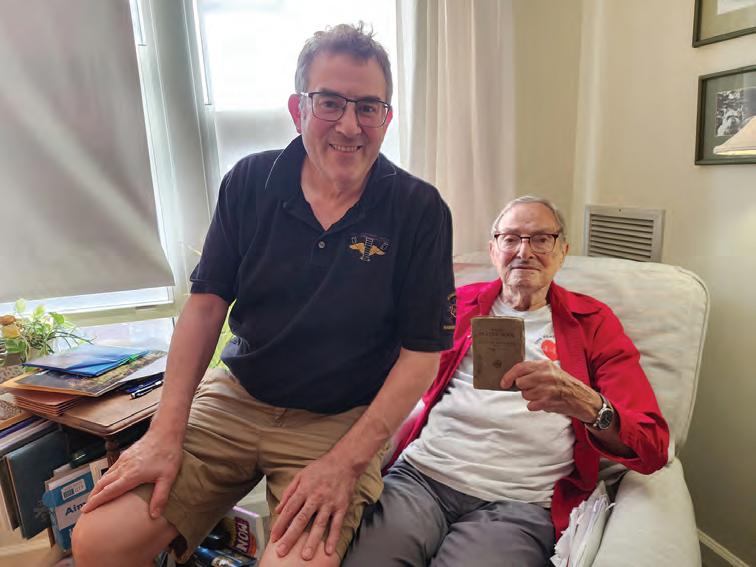
18,000 fellow soldiers, Berkowitz was called into his commander’s office.
“He told me, ‘We don’t have a Jewish chaplain in our outfit,’” Berkowitz said.
“‘You’re it.’”
Berkowitz became the acting Jewish chaplain of the 224th General Hospital. One responsibility was familiar: lead services. Another duty was less common. On Passover, he was tapped to prepare and direct a seder for patients, doctors, nurses and Jewish enlistees. Stationed in Evreux, France, the Jewish chaplain faced a dilemma. The Army only delivered two bottles of wine for the 50-person gathering.
“I declared scotch kosher for Passover,” he said.
Berkowitz doesn’t remember whether
the four-cup precept was fulfilled. He does remember a text he was given at the time.
The small hardcover copy titled, “Abridged Prayer Book for Jews in the Armed Forces of the United States,” remains tucked inside his navy blue tallit bag. Though he stopped using the siddur long ago, he still brings it with him, along with a yarmulke and prayer shawl, to Rodef Shalom every Shabbat.
Less a creature of habit than a conscientious practitioner, Berkowitz follows a familiar routine. Six days a week, he attends an exercise class at Weinberg Terrace. Every day, he calls his daughter, son and brother.
“I do that because I want to stay in touch, and when I say, ‘stay in touch,’ I mean not by email,” he said. “It’s important for me, and I hope it’s important for them.”
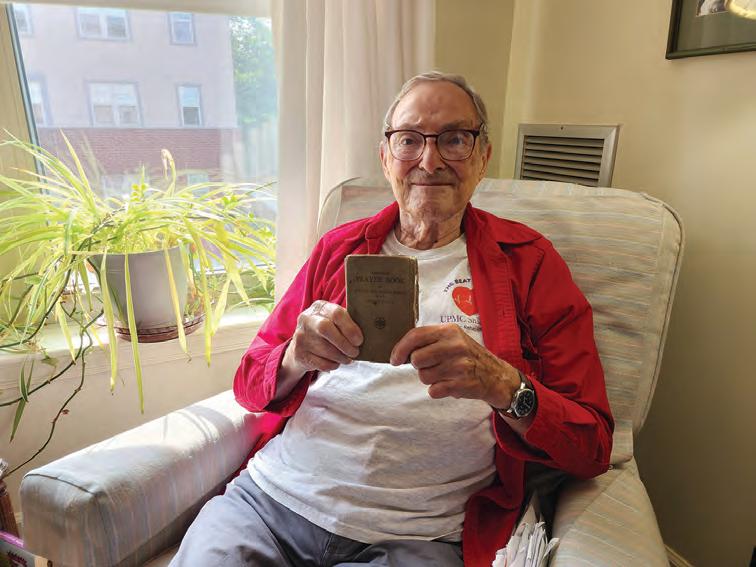
Hearing someone else’s voice has an effect — it does in 2025 and it did in 1946. After returning from Japan, years before meeting and marrying the late Nancy Gross, Berkowitz immediately registered for summer school at City College. The detail is significant, he said, because “when I walked into my first class — and the class was in partial differential equations — the instructor standing in front of the room was Mr. Barber, who was my freshman math instructor.”
Peering out from the front of the room, the teacher said, “Welcome back, Mr. Berkowitz.” Barber’s words mattered because “you think of all the people he wasn’t able to welcome back,” Berkowitz said. “We all cared about one another in those days.”
Thanks to the GI Bill of Rights, Berkowitz later transferred to Columbia University. After completing his undergraduate degree, he earned a master’s in chemistry at the university.
Following graduation, he accepted a job at Los Alamos National Laboratory, established in 1943 as a secret site to design nuclear weapons.
“One of the things that I had to do in Los Alamos was Robert Oppenheimer came there, and I had to take him on a tour of the site that I worked at,” Berkowitz said. “It was just Oppenheimer and me.”
Berkowitz did not reveal what he and “father of the atomic bomb” discussed. He also did not share information about his other duties at Los Alamos.
“I was working on classified material, and I really can’t say, but it had to do with statistical analysis,” he said.
Having outlived nearly every contemporary, and nearly 80 years post-project, why stay silent?
The answer, Berkowitz said, is “I believe that when we have laws and regulations, it’s our responsibility to observe those laws and regulations. And I can’t say any more than that.”
A few months from now, Berkowitz will celebrate his 100th birthday.
Who’s on the guest list? Will there be a cake, a slideshow, speeches?
“We’re keeping that part of it quiet,” David Berkowitz, 61, told the Chronicle.
Seated beside his father, while visiting from Washington D.C., the son said he enjoyed hearing his father recapitulate old tales.
Repetition isn’t an irritant; in fact, it’s a pleasure and a gift, David Berkowitz said.
“There are times where he’ll repeat something to me, but I made a decision a long time ago that I wasn’t going to get upset about my parents getting older. I got to hear them tell the story a second time.” PJC
Adam Reinherz can be reached at areinherz@pittsburghjewishchronicle.org.


or home delivery, c all 412-687-1000, ext. 2
By Deborah Weisberg | Special to the Chronicle
Dr. Michael Goldberg was 30 and a resident physician at the University of Pennsylvania School of Medicine before he finally learned the cause of the muscle weakness that had plagued him since childhood.
A workup by a world renowned medical geneticist revealed that Goldberg had been born with RYR-1, a rare disorder for which there is no FDA-approved treatment and no known cure.
Now 49, Goldberg and his wife, Lindsay Goldberg, of Mt. Lebanon, are working to change that through the RYR-1 Foundation that they and Michael’s parents launched in 2014. In its mission to support research and raise awareness of the historically underexplored disease, the foundation has so far raised more than $6 million and awarded over $1.5 in grants aimed at unraveling some of RYR-1’s mysteries.
In July, the foundation will host its fourth International Family Conference at the Hyatt Regency Pittsburgh International Airport for RYR-1-affected children and adults, and a two-day workshop for physicians, genetic counselors and other RYR-1 experts from around the world.
“These conferences are life-changing,” said Lindsay Goldberg, 41. “Researchers get to meet who they are doing their work for. And families are receiving resources. This is the sort of community building you can’t put a price on.”
RYR-1 is an inherited disorder affecting the muscles that control voluntary movement. It occurs as a result of mutations in the RYR-1 gene, which plays a critical role in muscle contractions, causing a range of congenital myopathies.
“There is a vast spectrum to the disease,” Michael Goldberg said, noting that RYR-1 can manifest in a variety of ways.
Some people with RYR-1 are in wheelchairs, while others are mobile but lack muscle tone or have difficulty chewing and swallowing. Still others have markedly increased muscle mass and strength — like retired NHL player Cody Hodgson, who now is a foundation spokesman — but are at risk of potentially deadly muscle breakdown (rhabdomyolysis) when exercising in hot weather. They also may react to anesthesia during surgery with an uncontrolled rise in body temperature (malignant hyperthermia) that can be fatal. Some people with RYR-1 experience significant muscle pain.
As part of his own journey with the disease, Michael Goldberg describes having been “a typical boy growing up, loving and wanting to play sports, although,” he said, “I wasn’t very good. Running to first base or on the soccer field I was slower than other kids, which opened me up to ridicule. I was the last kid picked for teams.”
He carried a backpack to school but had

to allow extra time to climb stairs. “I worked as hard as I could at everything I did, including gym,” he said. “And it was a different era. There was less awareness of people with special needs. You’d just do your best and not make excuses.”
Although his mother and physician father took him to a series of specialists, none diagnosed what he had. The RYR-1 gene was sequenced in 1988, when Michael Goldberg was 13, and it has taken decades, he said, “for scientists to appreciate the range of manifestations associated with
And while genetic testing has improved and become more accessible, misdiagnoses of RYR-1 and other diseases like muscular dystrophy, myasthenia gravis and multiple sclerosis remain common, especially among less severely affected or older individuals, Michael said.
RYR-1, Michael Goldberg works full time as director of neuroradiology for the Allegheny Health Network, and enjoys a robust family life with his wife and sons, ages 7 and 10.
Although he avoids certain activities like climbing stairs, cooking and shoveling snow, he and his wife have adapted their home to make everyday life easier, including installation of an elevator. They find outings to sporting events and restaurants are doable with a little logistical planning and have scheduled a family trip to London for later this year.
“Living with RYR1 modifies the way you think and deal with life,” said Lindsay Goldberg, who learned about her husband’s disease on their second date 18 years ago. “But I’m now on cruise control. Dealing with the disease has become second nature.”
A can-do attitude is essential to living fully with RYR-1, said Marcie Epstein of Romansville, Chester County, who is raising her son Jackson, 16, to believe that he can accomplish “whatever he sets his mind to” despite having the disease.
“I told him we are not going to limit you. We are not going to say ‘no.’ If there’s something you want to do, we’ll figure out how.”
“If you have unexplained muscle weakness make sure you are going to a reputable specialist and not an untrained
Despite the challenges of living with

Diagnosed in infancy with a type of RYR-1 called central core disease, Jackson has endured more than a dozen orthopedic surgeries and gets around in a manual wheelchair. He has traveled the world, celebrated his bar mitzvah, shoots pool, plays in a marching band, maintains a 4.3 grade point average and will soon begin looking at colleges, Epstein said. “I can’t even describe how amazing he is.”
The Epsteins have been involved with the Goldbergs’ foundation for years and will travel to Pittsburgh for the conference in July.
“To connect with other families who are affected and who understand is invaluable,” Epstein said. ‘When we get together we’re like ‘How did you handle this? What did you do about that?’ There’s not a lot of information on RYR-1 out there so to get into a room with experts who dedicate their lives to researching your disease is so important. It gives you hope.”
How many people are living with RYR-1 isn’t known, although Michael Goldberg believes the number is far greater than the 1 in 90,000 typically quoted. The foundation recently commissioned a study by researchers at Kings College of London aimed at determining RYR-1 prevalence.
Anecdotally, RYR-1 appears to occur equally among men and women, and to occur more among individuals of European descent than Latinos, Asians and African Americans, Michael Goldberg said, noting that some data suggests that certain mutations of the RYR-1 gene may be more common among Ashkenazi Jews. PJC
Deborah Weisberg is a freelance writer living in Pittsburgh.
By David Rullo | Senior Staff Writer
For Karen Gal-Or, life is sometimes all about the timing.
The University of Pittsburgh alum had been thinking about organizing a Jewish alumni group even before the AntiDefamation League gave the university a “D” on its annual antisemitism report card, citing the lack of just such a group as one of its determining factors.
“I reached out and was put in touch with Nancy Merritt, who is the vice chancellor for alumni relations, and she said that it was great timing because she had also been looking into building something like this,” she said.

Gal-Or had been reaching out to organi zations and leaders like Chabad at Pitt Rabbi Shmuli Rothstein and Hillel JUC Executive Director and CEO Daniel Marcus about trying to build a network in support of Jewish students and alumni.
Once the university said it was interested in the creation of the group and agreed to provide some funding, Gal-Or spoke with Marcus who helped select a date — June 29 — for its first event, which was billed as a Pitt Alumni Jewish Reunion.
Rothstein helped secure a location — Our
Giving Kitchen in nearby Squirrel Hill — and Gal-Or helped promote the reunion.
Nearly 65 people registered for the event.
“I was really excited to see a lot of younger people, which shows they’re still engaged,” Gal-Or said. “There were a lot of recent graduates, some graduates from my era. I graduated in 2006.”
Jewish students have had a difficult time on college campuses across the country, Gal-Or said, which was part of impetus for
the creation of the alumni group.
“As they are navigating the sort of hostility and isolation of antisemitism, they shouldn’t feel alone,” she said. “I thought now was a great time to create a network of alumni to provide moral support and other tangible resources like mentorship, job connections, advocacy and Shabbat dinners.”
Jewish student life has been on Gal-Or’s mind for some time.
Last year, she said, an event was organized
on campus where the names of those murdered during the Holocaust were read.
“I really wanted to make sure there were members of the community and Jewish alum who were there, so I reached out and a few went, but it wasn’t as many as it should have been,” she said.
Gal-Or said that if students are taking the time to create these events, they should be supported by Jewish faculty and alumni.
The hope, she said, is that this is the first step in building a community around the students, so they understand there is a group of graduates who care about their security and want to see them flourish at Pitt.
Chabad at Pitt’s Rothstein said that there was a lot of positive energy at the initial reunion, something that will benefit everyone in the long run.
“The more the alumni feel they have a relationship with each other and with the current students, they’ll feel better and more connected to the university,” he said.
Jewish alumni, he said, enjoyed their experience at the university, which he called a “beautiful place to be a Jewish student. I love the fact that the university is working towards making it even better.”
His hope is that the new Jewish alumni group will allow former students to return to the school and see all that it still has to offer.
Submit calendar items on the Chronicle’s website, pittsburghjewishchronicle.org. Submissions also will be included in print. Events will run in the print edition beginning one month prior to the date as space allows. The deadline for submissions is Friday, noon.
SUNDAYS, JULY 6–DEC. 28
Join Chabad of Squirrel Hill for its Men’s Tefillin Club. Services and tefillin are followed by a delicious breakfast and engaging discussions on current events. 8:30 a.m. 1700 Beechwood Blvd. chabadpgh.com.
Join a lay-led online Parashah study group to discuss the weekly Torah portion. No Hebrew knowledge needed. The goal is to build community while deepening understanding of the text. 8:30 p.m. For more information, visit bethshalompgh.org/online-parashah.
q MONDAYS, JULY 7–SEPT. 29
Join the 10.27 Healing Partnership for Roll for Insight: Community-Building Role-Playing Games. Meet every other week to connect and grow with new friends through playing tabletop role-playing games designed to inspire emotional depth. They will use RPGs to explore the intersection of identity, emotional resiliency and games to fight isolation and disconnection, and to meet new people and form friendships. Free. No experience required. 16 and up. 5:30 p.m. Jewish Community Center, 5738 Forbes Ave. 1027healingpartnership. org/rpg-club.
MONDAYS, JULY 7–DEC. 29
Join Congregation Beth Shalom for a weekly Talmud study. 9:15 a.m. For more information, visit bethshalompgh.org.


Join Temple Sinai for an evening of mahjong every Monday (except holidays). Whether you are just starting out or have years of experience, you are sure to enjoy the camaraderie and good times as you make new friends or cherish moments with long-term pals. All are welcome. Winners will be awarded Giant Eagle gift cards. All players should have their own mahjong cards. Contact Susan Cohen at susan_k_cohen@yahoo.com if you have questions. $5. templesinaipgh.org.
WEDNESDAYS, JULY 9–SEPT. 3
Join Rodef Shalom Congregation for Biblical Garden Open Door Tours: free, docent-led tours of the congregation’s Biblical Botanical Garden the first Wednesday of the month. 12:15 PM. 4905 Fifth Avenue. rodefshalom.org/garden.
WEDNESDAYS, JULY 9–DEC. 31
Temple Sinai’s Rabbi Daniel Fellman presents a weekly Parshat/Torah portion class on site and online. Call 412-421-9715 for more information and the Zoom link.
Bring the parashah alive and make it personally relevant and meaningful with Rabbi Mark Goodman in this weekly Parashah Discussion: Life & Text 12:15 p.m. For more information, visit bethshalompgh. org/life-text.
THURSDAYS, JULY 10–JULY 31
Are you looking to incorporate mindfulness into your routine and make meaningful connections with others? Join the 10.27 Healing Partnership for Open Morning Meditation. Engage in individual, quiet meditation for approximately 20 minutes, followed by approximately 20 minutes of group reflection, thoughts and warm community-building. Free; all experience levels, no registration required. 8 a.m. Jewish Community Center of Greater Pittsburgh, 5738
Forbes Ave., Room 316. 1027healingpartnership.org/ open-morning-meditation.
MONDAYS, JULY 14-28
Join Chabad of Squirrel Hill for Torah and Tea. Learn from three inspirational messages for the three weeks of mourning. 7 p.m. Email caltein@chabadpgh.com for address. chabadpgh.com/tea.
FRIDAYS, JULY 18, AUG. 22
Gather in Rodef Shalom’s Biblical Garden for a 20s and 30s Kabbalat Shabbat. Get to know other young Jewish professionals and close out the week with apps, wine and great company. Registration required. 7 p.m. 4905 Fifth Ave. rodefshalom.org/ lateshabbat.
Join Chabad of the South Hills for Baby Loves Shabbat, music and movement for ages 0 to 3. Challah making and Shabbat songs. 3:45 p.m. 1701 Bower Hill Road. chabadsh.com.
TUESDAY, JULY 22
Young children and their grown-ups are invited to join Rodef Shalom librarian Sam Siskind for a story in the Biblical Garden, followed by a crafty activity. 1:15 p.m. rodefshalom.org.
WEDNESDAY, JULY 23
Join the Jewish Community Center for Dave Wright Defensive Tactics Training for Seniors, a dynamic and confidence-building workshop designed specifically for older adults who want to take charge of their personal safety. In this hands-on session, trained instructors will guide participants through simple, yet e ective, self-defense techniques tailored to di erent mobility levels. No prior experience needed. 1:30 p.m. Free. 345 Kane Blvd. jewishpgh. org/event/catt-seniors.
MONDAY, JULY 28
Join the Zionist Organization of America for the Kandy Ehrenwerth Memorial Lecture featuring Mitchell Bard presenting “American Colleges and Universities are Selling Out to Middle East Oil Money.” 7 p.m. Free, but reservations are required at pittsburgh@zoa.org. Jewish Community Center of Pittsburgh.
WEDNESDAY, JULY 30
Enjoy an hour of nourishment for the mind, body, and soul at Chabad of Squirrel Hill’s Ladies Lunch and Learn. Explore words of the heart for the month of Av. Noon. $18. 1700 Beechwood Blvd. chabadpgh.com/lunch.
FRIDAY, AUG. 8
Women are invited to bake and shape flower challahs at Chabad of Squirrel Hill’s Loaves of Love 10 a.m. $12. 1700 Beechwood Blvd. chabadpgh.com/lol.
SUNDAY, SEPT. 14
The University of Pittsburgh Jewish Studies Program and Rauh Jewish Archives present O erings of Grief, O erings of Rage: Revisiting Tree of Life Synagogue and George Floyd Square. Laura Levitt will explore how people individually and collectively grieve after mass, public tragedies. Her talk will illustrate how the memorial items at the George Floyd and Oct. 27 memorials, when viewed together, can teach us about racism and antisemitism. 5 p.m. JCC Katz Auditorium, 5738 Forbes Ave. 1027healingpartnership.org/event/lauralevitt.
SUNDAY, SEPT. 21
All kids are invited to a pre-Rosh Hashana Challah Bake, where they will make and braid their own challah to take home, plus enjoy a fun kitchen chemistry workshop with Mad Science. 1 p.m. $10/ child. 1700 Beechwood Blvd. chabadpgh.com/ kidscooking. PJC

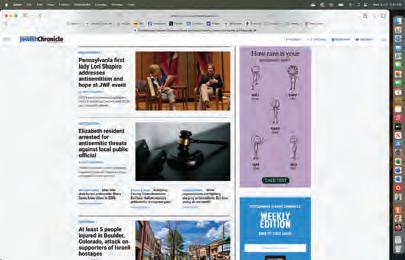












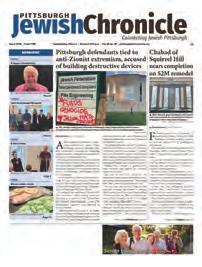


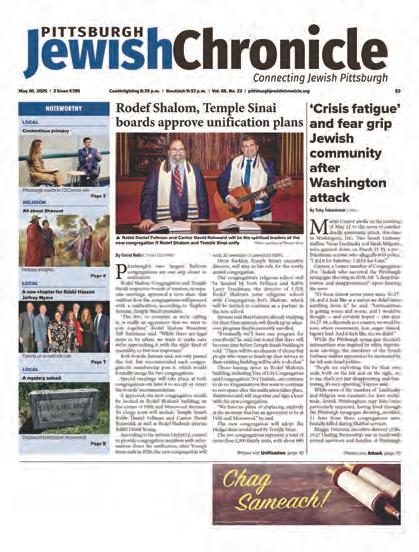


he Pittsburgh Jewish Chronicle invites you to join the Chronicle Book Club for its Aug. 3 discussion of “Jerusalem, Drawn and Quartered: One Woman’s Year in the Heart of the Christian, Muslim, Armenian, and Jewish Quarters of Old Jerusalem,” by Sarah Tuttle-Singer. From Amazon.com: “On a night in 1999 when Sarah Tuttle-Singer was barely 18, she was stoned by Palestinian kids just outside one of the gates to the Old City of Jerusalem. In the years that followed, she was terri ed to explore the ancient city she so loved. But, sick of living in fear, she has now chosen to live within the Old City’s walls, right at the heart of the four quarters: Christian, Muslim, Armenian, and Jewish. ... ‘Jerusalem, Drawn and Quartered’ is a book for anyone who’s wondered who really lives in Israel, and how they coexist. It’s a book that skillfully weaves the personal and political, the heartwarming and the heart-stopping. It’s a book that only Sarah Tuttle-Singer can write. e Old City of Jerusalem may be set in stone, but it’s always changing—and these pages capture that. “
Your hosts
Toby Tabachnick, Chronicle editor
David Rullo, Chronicle senior staff writer
How it works
We will meet on Zoom on Sunday, Aug. 3, at 1 p.m.

What to do
Buy: “Jerusalem, Drawn and Quartered.” It is available from online retailers, including Amazon and Barnes & Noble. It is also available through the Carnegie Library system. Email: Contact us at drullo@pittsburghjewishchronicle.org, and write “Chronicle Book Club” in the subject line. We will send you a Zoom link for the discussion meeting. PJC
— Toby Tabachnick




By Larry Cohler-Esses | JTA
Twenty-four members of the Jewish community in Tehran and Shiraz remained in prison as of Sunday after being arrested along with hundreds of others in a sweeping government crackdown in Iran that began as fighting ended with Israel.
The arrests took in 35 Jews originally, according to a report put out Saturday by HRANA, the Human Rights Activist News Agency, an affiliate of the Human Rights in Iran NGO. Mass arrests began early in the morning of June 23, according to the report. Eleven Jews have been released since the original arrests, according to a former senior Iranian communal leader, who would speak only on condition of anonymity due to concerns for his contacts in Iran..
The charges filed against those being held — having contact with Israel — have the potential to ensnare many members of the Jewish community, he said. Iranian officials have been hunting alleged collaborators with Israel following Israel’s recent attacks on Iran and the United States’ bombing of the country’s most fortified nuclear facility.

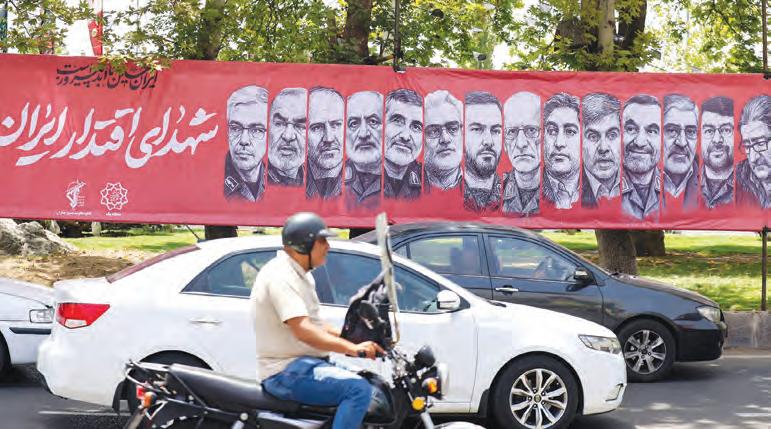
The former Iranian communal leader, who remains in close touch with the community, said Iranian authorities are checking the cell phones of those they arrest, looking for records of any calls to the Jewish state.
“Most Iranian Jews have family in Israel,” explained the former high-ranking communal leader, who today lives in Los Angeles. “That’s why they call” the country.

During the military conflict earlier this month, as each side targeted the other side’s cities with missiles and drones, many Iranian Jews reached out to check on the safety of their relatives.
“They are completely prohibited from any connection to Israel,” he said. But such communications were quietly tolerated over the years given the reality of Jewish family connections. In the wake of the war with
Israel, the authorities are now drastically tightening their policies. Under the new rules, he said, “They can accuse anyone of being a spy for Israel.”
The arrests of the Jews, who reportedly include several rabbis, appear to be part of a crackdown in which more than 700 people have been taken in since June 13, when Israel initiated its attacks on Iran. Jerusalem described the attacks as an effort to stop Tehran’s development of a nuclear program building toward Iranian nuclear weapons capabilities.
Tehran denies this. But Israel views Iran, which has vowed to destroy the Jewish state, as an existential threat.
Minorities are especially concerned over the detentions. Last Wednesday, Iran announced that it had executed three men from Iran’s ethnic Kurdish population who were convicted of aiding Mossad, Israel’s foreign intelligence agency, in the 2020 assassination of Mohsen Fakhrizadeh, a prominent nuclear scientist.
The sweep comes as Israeli authorities themselves have boasted about the deep penetration into Iran their intelligence agencies achieved as part of Israel’s planning for its attack. In mid-June Mossad












Zohran Mamdani belongs to the Democratic Socialists of America, a leading critic of Israel. Here’s what to know.
— NATIONAL —
By Asaf Elia-Shalev | JTA
It was a Jewish politician, Bernie Sanders, whose surprisingly strong showing in the 2016 presidential primaries brought the Democratic Socialists of America to prominence. Although not a member of the group, Sanders identifies as a “democratic socialist.” The DSA endorsed him, and his candidacy inspired a surge in membership.
Nine years later, the DSA has endorsed another rising progressive star, and this time he is a member: Zohran Mamdani, a member of DSA’s New York chapter, who last week pulled off a stunning upset in the Democratic primary for New York City mayor.
Mamdani’s victory was hailed by those who share DSA’s progressive domestic platform, characterized by a strong social safety net, support for the working class and significant government involvement in the economy.
At the same time, it sent shockwaves among the pro-Israel leadership and mainstream, who view the DSA’s positions on Israel and the Israeli-Palestinian conflict as anathema. The DSA platform accuses Israel of apartheid, colonialism and military occupation, while pledging solidarity with the Palestinian cause. The group considers the Gaza war a genocide; supports BDS, the movement to boycott Israel, and calls for an end to American aid to Israel.

The platform does not endorse any particular formula for resolving the conflict but says any political solution must be

grounded in the right of Palestinian refugees to return, an outcome Israel contends would spell the end of its existence as a Jewish state.
Z amdani won while fully embracing the DSA’s policies on Israel, for which he faced blistering accusations of antisemitism.
So what is the DSA and where does it actually stand on Israel? Read on for a description of how its position has hardened over time, and the Israel-related controversies it has weathered to reach its current popularity.
Calling itself the largest socialist organization in the country, the DSA claims to have more than 80,000 dues-paying members, with chapters in every state, and promises to represent the interests of the working class.
Although the DSA’s own political platform calls for “the abolition of capitalism and the creation of a democratically run economy that provides for people’s needs,” political candidates backed by the DSA generally don’t advocate the overthrow of the American government or seek to abolish capitalism. They focus on enacting changes that would make the United States resemble Scandinavian democracies.
Mamdani has himself said that he has “many critiques of capitalism.”
On June 27 he told CNN, quoting Martin Luther King, “In the words of Dr. King decades ago, he said, ‘Call it democracy or call it democratic socialism; there must be a better distribution of wealth for all of God’s children in this country.’”
DSA was not always the home of some of Israel’s staunchest critics, nor a harbor for those calling to boycott the country. In fact, many of the people who helped found the group in 1982 were sympathetic to Zionism, and some even considered themselves friends of Israel.
“[Michael] Harrington was a deep believer in Israel,” DSA co-founder Jo-Ann Mort once wrote of the group’s most prominent early
leader. According to Mort, Harrington, who died in 1989, was a friend of Shimon Peres, the late Israeli prime minister, and for a time shared with Peres a skepticism about the cause of Palestinian statehood.
“It’s unlikely that he would have felt at home, were he alive, in the organization he founded,” Mort wrote in Fathom.
DSA’s position on Israel, if anything, stalled the momentum it gained after Sanders’ campaign and nearly discredited the DSA, as many of the politicians who had risen with the party’s backing publicly denounced its response to the Hamas-led massacre of Israeli civilians on Oct. 7, 2023.
Mort, a consultant who has worked with a number of left-leaning Jewish organizations, relayed the history of the movement and Israel in a 2017 essay condemning DSA’s decision to endorse the BDS movement. She argued that democratic socialists should be advocating for peace between Israelis and Palestinians, rather than embracing a political program that would negate Israel’s right to exist.
Less than two years ago, it seemed that the DSA’s hardline stance on Israel could become too big a liability for progressive politicians, relegating the group back to the political fringe of the pre-Bernie days.
“The Democratic Socialists of America is coming apart at the seams,” Politico wrote in a story about the group’s reckoning on Israel, four days after Hamas and other terrorist groups invaded Israel from Gaza, killing and kidnapping hundreds.
Two prominent progressives who had earned the DSA’s endorsement, Rep. Alexandria Ocasio-Cortez and Jamaal Bowman, then also a House representative, condemned a pro-Palestinian rally promoted by DSA, at which some attendees cheered the massacre of Israeli civilians on Oct. 7. Bowman had already nearly been expelled from the group over a trip
Boulder firebombing victim Karen Diamond, 82, dies of her injuries
An 82-year-old victim of the firebombing attack at a Boulder, Colorado demonstration for Israeli hostages has died from her wounds, JTA reported.
The victim, Karen Diamond, “died tragically as a result of the severe injuries that she suffered in the attack,” according to a statement released by the Boulder County District Attorney’s Office.
Diamond is one of 29 targets in the June 1 attack, of whom 13 suffered physical injuries, according to an amended complaint by the district attorney’s office. The suspect in the firebombing attack, Mohamed Sabry Soliman, will now face two counts of murder as a result of Diamond’s death.
Soliman was indicted on 12 hate crime counts last week, and his lawyer entered a not guilty plea for him Friday. He is accused of trying to kill eight people at the attack on the demonstration Run for Their Lives, in which he threw two molotov cocktails at the group.
Diamond, a longtime member of Bonai Shalom congregation in Boulder, is survived by husband Lou, sons Andrew and Ethan, their wives, and five grandsons.
“This event and the tragic loss of someone who has given so much of herself over the years to the Bonai community and beyond, has impacted us all and we are sad and horrified,” the congregation’s rabbi, Marc Soloway, said in a statement.
Soliman also faces 118 charges, including 28 counts of attempted murder, in Colorado state court. Soliman, an Egyptian national who officials say had been illegally living in the United States, did not speak at the federal hearing last week, and he listened to translations provided by an Arabic interpreter through headphones, according to the Associated Press.
In the span of a few minutes last week, the Brooklyn Nets single-handedly doubled the Jewish population in the NBA from two to four, JTA reported.
The Nets selected Israeli Ben Saraf and Israeli-American Danny Wolf back to back with the 26th and 27th overall picks in NBA Draft.
Wolf, a 7-footer from the University of Michigan, was projected to go earlier in the round, while some prognosticators had Saraf, a 19-year-old currently playing in the German professional league, to slip to the second round. Instead, Saraf and Wolf were selected in quick succession toward the end of the first round and will be teammates in Brooklyn. Wolf, 21, transferred to Michigan last year after two solid seasons at Yale, and led the Wolverines to a No. 5 seed in March Madness, where they lost in the Sweet 16 to Jewish coach Bruce Pearl and No. 1-ranked Auburn. The Glencoe, Illinois, native averaged 13.2 points and 9.7 rebounds per game this past season, while shooting 49.7% overall and 33.6% on three-pointers.
July 7, 1969 — U Thant: ‘Open warfare’ along canal
Saraf, who is 6-foot-6, is the son of two former Israeli pro basketball players, and he wears No. 77 because it represents the Hebrew word “mazal,” which means luck. He averaged 12.8 points and 4.6 assists per game this year as he helped lead his team to the German league finals.
This marks the first time since 2006 that two Jewish players were selected in the same NBA draft. That year, Lior Eliyahu and Yotam Halperin were both taken in the second round, though neither appeared in the league.
German court overturns ban on farright antisemitic magazine, citing freedom of expression
A German court overturned a ban on a far-right German magazine that frequently espouses antisemitic and anti-immigrant rhetoric, JTA reported.
In last week’s decision, the German Federal Administrative Court in Leipzig ruled that while the magazine, Compact, frequently presents unconstitutional viewpoints, it does “not yet” present a threat to Germany.
The initial ban on the incendiary magazine had been put in place last June after the court found Compact had “rejected the constitutional order and exhibited a fundamentally anti-constitutional stance” in its publications.
Nancy Faeser, the interior minister at the time of the initial ban last year, called the magazine “the main mouthpiece for the rightwing extremist scene” and said that it “agitates in an unspeakable way against Jews, against people with a history of migration and against our parliamentary democracy.”
But in the recent ruling, the judge found that while Compact had promoted anti-constitutional ideas, that did not justify the ban.
“The basic law guarantees even the enemies of the constitution, with faith in the power of free societal debate, freedom of expression and the press,” the presiding judge Ingo Kraft said.
Compact has close ties with Germany’s far-right Alternative for Germany (AfD) party, which was formally classified as extremist by the German government in May, drawing praise from the local Jewish community. In February, Vice President J.D. Vance drew criticism after he attacked the so-called “firewall” Germany’s mainstream parties have maintained against AfD.
Woman indicted for antisemitic hate crime on NYC subway
Woki Massaquoi, 35, was indicted last week for allegedly attacking a 38-year-old woman on a subway while making antisemitic remarks in April 2025, according to a JNS report
The defendant is charged with two counts of hate-crime assault in the third degree and a count of second-degree aggravated harassment.
Massaquoi is accused of directing a slur at the victim and calling her a “white Jew” while slapping a coffee cup from her hand and assaulting her aboard a train in Midtown Manhattan on April 29.
The defendant is accused of punching the victim on her face and pinning her to the floor of the train. PJC
— Compiled by Toby Tabachnick


Items are provided by the Center for Israel Education (israeled.org), where you can find more details.
July 4, 1976 — Hostages are rescued at Entebbe
Israeli commandos storm the airport in Entebbe, Uganda, to rescue 106 hostages from a hijacked Air France flight. All seven terrorists, 20 Ugandan soldiers, three hostages and one Israeli soldier (Yoni Netanyahu) are killed.
July 5, 1979 — Opera star Edis De Philippe dies
Israel National Opera Company founder and star Edis De Philippe dies at 67 after brain surgery. She made aliyah in 1945, and the Zionist Congress in December 1946 approved her plan to launch the opera company.
July 6, 1989 — Bus attack kills 16
A Palestinian Islamic Jihad terrorist seizes a bus from Tel Aviv as it passes a ravine outside Jerusalem and steers it over a cliff. Sixteen people, including one American, are killed, and 17 others are injured.
U.N. Secretary-General U Thant says he is considering withdrawing U.N. observers from the Suez Canal zone because of “open warfare” there as Egypt and Israel shoot across the canal daily.
July 8, 1958 — Politician Tzipi
Livni is born
Tzipi Livni is born in Tel Aviv. She is first elected to the Knesset in 1999 with Likud. In the 2009 election she leads Kadima to the most seats but can’t form a government. She forms Hatnua in 2012.

p Tzipi Livni, then Israel’s foreign minister, speaks with Palestinian Prime Minister Salam Fayyad at the World Economic Forum in 2008. By Andy Mettler for World Economic Forum, CC BY-NC-SA 2.0, via Flickr
July 9, 1967 — Bernstein concert celebrates war victory

Leonard Bernstein conducts the Israel Philharmonic Orchestra on Mount Scopus to celebrate the cultural unification of Jerusalem after the June 1967 war. The concert features Mahler’s “Second Symphony.”
July 10, 1895 — Zionist leader
Nahum Goldmann is born
Nahum Goldmann, a founder of the World Jewish Congress and the Conference of Presidents of Major American Jewish Organizations, is born in Lithuania. Starting in 1935, he lobbies for the partition of Palestine. PJC

Israel:
Continued from page 1
Levi said he was moved from Tel Aviv to Eilat. From there, the group — nearly 1,600 people from various programs in Israel — was taken by cruise chip to Cyprus before catching a flight from Rome back to the States.
“It was very conflicting,” he said. “People were trying to have a good time and enjoy it, but we were also fleeing war, so it was very weird and dynamic.”
Levi was born in Israel but grew up in the United States. His father is Israeli and his parents lived in the Jewish state for nearly two decades, including during the Gulf War. That experience gave Levi’s mother a sense of perspective others might not have.
“We weren’t as concerned after Oct. 7, his being there,” she said. “I know the guides have people who are up to date on the security situation, making sure not to take them to places that could be at risk.”
Still, she said, it was concerning to hear reports about Tel Aviv coming under Iranian fire.
Levi said both his parents wanted regular updates but tried not to create more stress in what was already a tense situation.
Iran:
Continued from page 1
Machine-Chian told about 20 attendees at a June 24 event hosted by StandWithUs and moderated by Julie Paris, the organization’s MidAtlantic regional director. “As long as you end up with the status quo, you’re fine.” But the situation changes “as soon as you point out something, disagree on something.”
Before fleeing Iran in 2021, MachineChian was targeted by the regime for his writings, he said, “but I knew exactly what I was doing, and I knew the risks. So in a sense, I deserved it. I knew the consequences. I did it anyway.”
He described the oppressiveness of the regime, noting many Iranians “are getting into trouble even though they have done nothing wrong. Our women, for example, they’re under all sorts of pressure from the regime. … I can tell you, they make your life miserable. They do anything and everything to discourage you from the simplest things.”
For example, he said, “you receive text messages with the address of your parents’ home to tell you that we know exactly where they live — and not for criticizing the Supreme Leader or something, for criticizing a policy, a policy that is being discussed by the politicians of the Islamic Republic. So that is the tolerance threshold of these people.”
While he declined to offer specific details of the tactics used against him, he acknowledged that he was questioned by government officials.
“Compared to other journalists, compared to other critics, actually, I was one of the most successful in the sense that I never received any prison sentence,” Machine-Chian said. “And I was writing for almost 20 years. So actually, among Iranian critics, probably I have seen the least amount of cruelty from the regime.”
“We got very concerned,” Levi’s mother said. “They moved to Eilat, which helped us feel better because we knew it wasn’t targeted. But the day they got there, a drone was shot out of the air.”
“They were in communication. They sent out regular emails. I really appreciated that. They even had a Zoom call with parents to ask any questions we had.”
And yet, a parent’s worry still lingers.
Daniel Marcus, the executive director of Hillel JUC, was one of the leaders tasked with ensuring the security of students who traveled to Israel as part of the Birthright Israel Onward program.
When the groups were eventually evacuated to the cruise liner, an Israeli Navy ship accompanied the boat to international waters.
Even the relative security of Cyprus didn’t provide complete safety, though.
“When they had just left Cyprus, there was a guy arrested who was planning a terror attack on Israelis and Jews,” she said.
Levi’s parents were happy with how Hillel JUC and Birthright Israel Onward handled the situation.
“I was very pleased,” his mother said.
‘dual life’
The culture of the Iranian people, he stressed, differs markedly from the ideology of the regime that governs them.
“There is, unfortunately, a dual life,” Machine-Chian said. “There is your private life in the institution of family, of friends,” not too different from the social life of Americans. “Iranian culture in general is very tolerant.”
But public life is different.
“In the public life, you have to adhere to the exact proscriptions of the ayatollah, and the ayatollah’s whim knows no bounds,” he said. As a result, people “get in trouble for the most random things. ... For example, if your heels are one inch too high — things like that. If you’re wearing a bad combination of colors — the morality police has, of course, discretion, and they take advantage of that discretion. And these are cruel people, of course. So this is a part of our daily lives.”
For years, Machine-Chian explained, “Iranian people tried to put up with all of that cruelty and everything. It got really hard to live like that, and it is still hard to live like that. So people started to push the boundaries. Women started to wear their scarves a little back, and a little more and a little more. And this makes, of course, the regime very uncomfortable, and they try to fight it. So there is a constant war going on in the Iranian society against the Islamic Republic.”
While official Iranian reports indicate that about 37% of Iranians support the regime, Machine-Chian said that other surveys show that support is actually in the single digits. Because support of the electorate is low, he said, the regime maintains control through “ruling by fear.”
Opposition voices are suppressed, he said, making it difficult for Iranians to get accurate information. Journalists who have escaped Iran thus try to stay connected with those living under the regime.
“When your child is there, even though he’s 20, it’s still very scary. It’s a different experience,” she said. “You feel helpless because there’s nothing you can do. There were no planes in and out. We couldn’t even go there if we wanted. We trusted completely in the group and the leadership of the group to take care of them and make good decisions.”
Daniel Marcus, the executive director of Hillel JUC, was one of the leaders tasked with ensuring the security of students who traveled to Israel as part of the Birthright
Turning to the recent war between Israel and Iran, Machine-Chian said that the Iranian government was “turning against their own people.”
“This is unique about the Islamic Republic,” he said. “They shut off internet during the time that people were trying to leave cities like Tehran. And Tehran is a large city. We’re talking about 11 to 13 million people, and so imagine millions of people are trying to leave the city. They need to have access to information to know what’s going on, road navigation and everything.”
It was the Israeli government, he said, that tried to notify Iranians to leave certain areas so they would be safe.
“In the past 15 to 20 years, Israel has done more than 20 operations inside of Iran, all surgical, virtually no collateral damage to any civilians,” he said. “And Iranian people know this, and believe and appreciate that.”
During Operation Rising Lion, Israel “could have destroyed Tehran,” he said. “They didn’t do that. And again, people notice. People understand.”
Iranians also understand the dangers posed by their government’s support of terrorist groups, including Hamas, Hezbollah and the Houthis, Machine-Chian said.
“They disapprove morally,” he said. “Of course they disapprove. Because what’s the result? What are we gaining by doing this? What else but pain and misery and fire and death of innocent people comes out of these groups? Nothing, really.”
There’s also a “financial argument” against Iran funding these groups, he said. “You’re sending billions of dollars, at the very least, to these groups,” while Iranians are having a difficult time providing for their families. Because funding terrorist proxy groups is so unpopular, he said, the
Israel Onward program.
“They created a fabulous plan,” Marcus said. “They supported and facilitated the students to get them back to their hometowns in the United States.”
Both Hillel and the Federation, he said, had complete confidence in Birthright Israel Onward’s ability to evacuate the students.
“They cared, managed and supported the students during a war,” he said.
Marcus said that Hillel JUC is exploring the possibility of returning students to Israel whose programs were cut short.
“There’s a lot of logistics, safety, security and practical elements of making that happen, and how, but we’re working with Birthright Israel Onward now to see if and how that’s possible,” he said.
That news would be of interest to Levi, who said he had enjoyed the first two weeks of his internship as well as the friendships he made.
Despite the war, that seems to be a popular opinion among those who took part in the program.
“All my friends say they really miss Israel,” Levi said. PJC
David Rullo can be reached at drullo@ pittsburghjewishchronicle.org.
government “no longer really defends it or talks about it,” he said.
Following Hamas’ brutal invasion of Israel on Oct. 7, 2023, the Iranian regime attempted to force Iranian civilians into the streets to express support for Hamas, Machine-Chian said. The attempt was a “failure.”
“To be honest, for me it was painful that nobody in the free world was talking about this,” he said. “Iranian newspapers received a directive not to print any pictures from Tehran, because nobody was in the demonstration in Tehran, and they did their best. They organized concerts in the streets. So basically, there was music to come to the streets. People consciously decided not to show up. So if you look at Iranian newspapers … they had to print Paris and Istanbul, and that was disheartening.”
Despite the current state of the government of Iran, Machine-Chian remains optimistic about the future and the ability of the Iranian people to “build a free society.”
“The values of liberty, values of the free society, are already popular inside of Iran, and the people, time and again, have tried to actually dictate with blood and tears to get rid of our dictators,” he said.
“What gives me hope is that political Islam is already bankrupted, already rejected by everybody, according to the biggest surveys we’ve had,” he said. “Political Islam basically is finished. We don’t really have to do anything in order to get rid of bad aspects currently plaguing Iran.”
It’s just a matter of getting rid of the harmful political institution “to have a normal country and be a respectable member of the international community. And that is my hope, to be honest. I want Iran to be a normal country like any other, and stop doing stupid things.” PJC
Toby Tabachnick can be reached at ttabachnick@pittsburghjewishchronicle.org.
Alumni:
Continued from page 5
In fact, Rothstein said, there’s a synergy present on the campus.
“Dan Marcus says all the time, ‘The tide rises all ships.’ I think anyone that looks at Pitt Jewish life — the support from the university, the collaboration between Hillel and Chabad, it’s par excellence. None of us are struggling,” he said.
The Jewish alumni group will now be a part of that experience, he noted.
Marcus said that he appreciated the opportunity for Hillel JUC to be a co-sponsor of the event.
“I was really excited to see a lot of younger people, which shows they’re still engaged. There were a lot of recent graduates, some graduates from my era.”
“This is a manifestation of the outstanding relationship between the university, Hillel and Chabad. It’s an example of how we can work together to benefit Jewish student life and be one community of Pitt Jewish alumni,” he said.
Iran:
Continued from page 7
even released footage purporting to show agents within Iran laying the groundwork for air strikes.
But Israel has no known record of recruiting assets from within Iran’s closely monitored Jewish community, which today numbers somewhere around 10,000 people. The community, which stood at over 80,000 before the 1979 Revolution that brought Iran’s Islamic regime to power, has generally remained free to practice their religion and organize themselves communally, including maintenance of their own schools and social welfare institutions. They remain free to
Mamdani:
Continued from page 8
he made to Israel and later let his membership lapse over disagreements with DSA about U.S. funding for Israeli defensive weapons.
Rep. Shri Thanedar of Michigan also cut ties with DSA at the time, citing the group’s refusal to unequivocally condemn terrorism as the reason for his departure.
On the West Coast, Los Angeles City Councilmember Nithya Raman, elected with DSA’s support, criticized the organization’s national statement on Hamas’ attack for overlooking the violence carried out by Hamas and for showing a lack of empathy toward Israelis.
And a few months later, in July 2024, DSA withdrew an endorsement from Ocasio-Cortez after she took part in a panel on antisemitism, which DSA claimed was aimed at conflating criticism of Israel with hatred of Jews. New York City Comptroller Brad Lander, who is Jewish and was another progressive candidate on the Democratic mayoral primary ballot, revealed during his campaign that after the Oct. 7 attack he left the DSA, which he had joined in 1987, citing the group’s response.
Born to the DSA
Mamdani has echoed views on Israel and the Palestinians that are nearly identical to the DSA platform, which is not surprising given that he found his way to democratic socialism through pro-Palestinian activism. As a student
Pitt’s Merritt said that based on the initial reunion and conversations she’s had with Pitt alumni, “There is definitely a desire to be part of a Jewish alumni affinity network, not just to connect with fellow Jewish alumni but to support current Jewish students at Pitt.”
emigrate, though taking their assets out with them can be a problem.
Those who remain live with various forms of legal discrimination that sharia, or Islamic religious law, imposes on all nonMuslims in Iran, and social discrimination that prohibits their rising above certain levels in government or military positions. But a 1979 fatwa, or religious ruling, issued by Grand Ayatollah Ruhollah Khomeini, the Islamic Republic’s founding leader,
–KAREN GAL-OR In the wake of the war with Israel, the authorities are now drastically tightening their policies.
The university has many different ways for alumni to interreact, Merritt said, but noted that whenever there is an opportunity to “convene around a specific interest or identity, and there are opportunities to help students like them, alumni get inspired to get engaged.”
forbade physical attacks on the community. Under Iran’s constitution they are also accorded an official representative in Iran’s parliament.
The Jewish alumni group, she said, is supported by the senior leadership at Pitt, including Chancellor Joan Gabel.
Marcus said the reunion, was a “wonderful event” and a positive first step and is looking forward to future activities.
To that end, Rothstein is already thinking of what comes next.
“We’re going to try to pull off an alumni Shabbat soon,” he said.
For Gal-Or, the reunion was simply the opening salvo for a group she wants to see expand and grow.
“I hope that it becomes bigger than me,” she said.
Those interested in participating in the Pitt Jewish Alumni Network can learn more by emailing alumni@pitt.edu. PJC
David Rullo can be reached at drullo@ pittsburghjewishchronicle.org.
merchants, teachers and rabbis, included allegations of contacts the group had with people in Israel.
at Bowdoin College, a liberal arts school in Maine, he helped found the campus chapter of Students for Justice in Palestine.
After graduating, he thought that Palestine activism would be disqualifying in American politics — until he met Khader El-Yateem. Running for city council in New York in 2017, Palestinian-American El-Yateem was a DSA candidate and BDS supporter, and Mamdani went to work on his campaign.
“He was a socialist, he was pro-BDS, and he was running for local office. These are all things that I had been told could never exist simultaneously in a person,” Mamdani said in a 2021 interview with Jacobin magazine.
“And their existence was not a cause for fear or anxiety among so many but, in fact, of inspiration.”
Mamdani also credits the rise of Bernie Sanders for his involvement in DSA organizing. Asked why he came to identify as a socialist, Mamdani started with the values instilled in him as a child — he’s the son of the well-known Indian-American filmmaker Mira Nair and Mahmood Mamdani, an Indian expatriate from Uganda and a prominent professor of postcolonial studies at Columbia University. But there was definitely a point at which I started to call myself a socialist, and that was Bernie’s 2016 campaign,” he told Jacobin. “Because I saw all of these beliefs and these values that I held so dear, espoused by a man who proudly called himself a socialist as a result of those beliefs.”
Nevertheless, in 1999, 13 members of the Shiraz Jewish community were arrested on charges of spying for Israel. Most of them were haredi Orthodox, which set them apart to some extent, from the mainstream of the community. Evidence used against the accused, who included local
From long shot to frontrunner
Early in this year’s Democratic mayoral primary, Mamdani’s bid was seen as a long shot in part because his politics on Israel were historically disqualifying in a city with more Jewish residents than any other city in the world, including Israel’s largest city, Tel Aviv.
As polling revealed that Mamdani was gaining ground, the race became a contest between him and his chief rival, former New York Gov. Andrew Cuomo, who made fighting antisemitism a central campaign promise. Cuomo attacked Mamdani over his views on Israel. Mamdani’s DSA-aligned positions also became fodder for criticism by many Jewish New Yorkers, who blamed the type of rhetoric he espoused for the reported rise in antisemitism in the city.
But rather than back down, Mamdani stood by the views for which he was criticized.
“My support for BDS is consistent with the core of my politics, which is nonviolence, and I think that it is a legitimate movement when you are seeking to find compliance with international law,” Mamdani said at a candidate forum hosted by the UJAFederation of New York.
He has also declined, when repeatedly asked, to condemn the pro-Palestinian protest slogan “globalize the intifada,” which many see as a call for violence against Jews in the Diaspora.
He has promised to take the concerns of
An intense international campaign on their behalf included the United States, France and Russia, whose governments challenged the fairness of their trials. Local Jewish leaders in Iran also protested their innocence. Ten of the 13 were convicted and sentenced to up to 13 years in prison. But they were eventually all freed early, in stages, with the last prisoners released in 2003.
“Really, it was very bad,” the former senior Iranian communal leader now in Los Angeles said, voicing hope the community would not face the same situation again. PJC
Jewish New Yorkers about safety seriously if he wins the general election and becomes mayor.
In its official statement welcoming Mamdani’s victory, the DSA did not mention his views on Israel, but rather focused on the candidate as “a representative of a workingclass socialist movement.”
“These election results are a rejection of the Democratic Party political establishment and point to a widespread desire for an alternative to the status quo, and the need for the working-class political party DSA is building,” their statement read.
Mort supported Lander, but now that Mamdani has won, she is backing him — and not only because he is the presumptive Democratic candidate. She is willing to look past his affiliation with the DSA because she believes he is not beholden to the group’s “doctrinaire” approach to politics. She also hopes Mamdani changes his position on BDS, if only because taking a position that alienates so many New Yorkers would make it harder for him to govern the city.
“The more I have looked into the way Mamdani ran his campaign, the depth of the support and the sophistication of it, I just can’t help but be very impressed, and I would hope that that would carry over into the way he would govern,” Mort said in an interview. “He has started to reach out to people who are not in his inner circle. I think that’s a good sign.” PJC
Guest Columnist
Jan Lee
This Fourth of July marks an unprece dented time for American Jewry. For most of us, this day has always stood as the one golden date in the year when neighbors and communities come together to celebrate the common American ideal. It’s a time when we suspend our differences with neighbors and strangers, and lean on a mutual understanding.
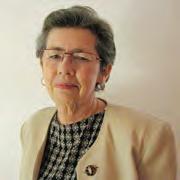
of a relatively select number of American revolutionaries, like George Washington, Benjamin ranklin, John Adams and a few more colorful characters, including Paul Revere and “LightHorse Harry” (Henry Lee III), who both served in the Continental Army against the British. Absent from that list of heroes were America’s Jewish patriots, who risked their lives and their livelihoods to support the war. Francis Salvador, the son of a wealthy Portuguese financier, was
Just because the Constitution guaranteed Jews the right to hold office at the federal level didn’t mean they would enjoy the same freedoms at the state level. Nor did it mean that Jews unilaterally had the right to vote. Voting laws, after all, were decided at the state level.
Jonas Phillips, who escaped the pogroms in Europe to search for a better life in the British colonies, exemplified the kind of fortitude and spunk it would ultimately take to change
to hold public office. His efforts also helped to inspire other states to follow suit.
In 1826, more than half a century after the Declaration of Independence was adopted, Maryland became the last state to pass a law permitting Jews to hold public office. Maryland’s “Jew Bill” also formally codified the right of Jews to vote in public elections.
But this year, America’s Day of Independence arrives in the shadow of one of the most consequential battles in recent Jewish history — U.S. airstrikes that have taken out much of Iran’s nuclear facilities, following 21 months of a proxy war with Israel that started on Oct. 7, 2023, with the Hamas-led terrorist attacks. That assault became a catalyst for uncontrolled antisemitism in North America and around the world.
While many of us naturally worry about what it will take for Israel to rebuild its cities, kibbutzim and fractured economy, I also worry about what it will take for us to heal the divisions that exist in the United States. What will it take for Jews to feel comfortable and safe again within our own communities? Is that even possible? And where can we turn for historical insight?
As we celebrate our nation’s 249th year, I can’t help but wonder what America’s early Jews could teach us about resilience and healing. Like many American children growing up in the late 20th century, I was taught to appreciate the heroism
As we celebrate our nation’s 249th year, I can’t help but wonder what America’s early Jews could teach us about resilience and healing.
the first Jew to be elected to South Carolina’s public assembly. It was a notable accomplishment, since Jews were banned in South Carolina from voting or running for office. He died in battle less than a month after the Declaration of Independence was signed into law.
Others, like the Polish financier Haym Salomon, used their business acumen, wealth and international connections to provide funding to support the revolution. He is widely credited as the financial brains behind the revolution, often positioning himself as a trustworthy guarantor for the government’s transactions. Like Salvador and other Jewish patriots, he was dedicated to seeing the new country succeed.
For many of America’s first Jewish citizens, however, it would take years — generations — to truly attain the right of equal representation.
How the West got the
Guest Columnist
Adam Slonim

In the early days of this overt round of the ongoing Israel-Iran combat, pundits and prognosticators lined up with remarkable confidence to deliver their verdicts: The Middle East was on the brink of a full-blown regional war. From CNN panels to X threads, from Instagram reels to endless political press briefings, the narrative seemed set in stone. There would be a chain reaction: Sunni Arab monarchies dragged in, Hezbollah launching from the north, the Houthis from the south, Syria lighting up once more. The Strait of Hormuz would close. Oil would spike. And Tehran would unleash waves of asymmetric revenge through a web of proxies from Beirut to Sanaa. Some predicted a war lasting months. Others spoke in terms of years. Yet here we stand, 12 days later. No Arab nation has joined the fray. The Strait of Hormuz remains open. No ground invasion of Iran has occurred. The oil markets remain remarkably steady. Tehran has neither launched a regional war nor exacted the cataclysmic reprisals so confidently predicted. No new front has opened with Israel, even as it already holds the line across seven existing flashpoints. There was one small attack on one U.S. base, but nothing else. In fact, the response from Iran — a heavily telegraphed barrage largely intercepted by air defenses
“Hatred of Jews and imported anti-Semitism from Europe did exist, but it did not flourish during the common struggle to separate from the power of England,” wrote Cantor Sheldon Foster Merel in a 2019 article. But “Jewish participation in the war did not assure the Jewish population [of] full, equal rights or erasure of anti-Semitism.”
attitudes toward Jews. In 1787 — 10 days before the Constitution was to be ratified — Phillips wrote to George Washington and appealed to the new government to endorse the right of religious freedom for all citizens. “To Swear and belive [sic] that the new testement was given by devine inspiration is absolutly against the Religious principle of a Jew and is against his conscience to take any such oath. By the above law a Jew is deprived of holding any public office or place of Government which is a Contradectory to the bill of Right Sect. 2 … .”
But his fight on this topic wasn’t over. In 1789, he petitioned the Pennsylvania state convention, asking the state to remove restrictive wording in its constitution that favored Christian citizens. The following year, the constitution was changed, granting new rights to non-Christians
Phillips, like many patriots who served in the war, became role models, both in service and values, for future generations. His grandson, Uriah Levy, became the first U.S. Naval commandant, a promotion he earned following his service in the War of 1812. He, too, was a vocal advocate for religious pluralism.
Perhaps the greatest legacy of America’s first Jews, however, was their faith in their power to effect change. The Jewish population amounted to barely 0.1 % of the colonies’ 2 million citizens, yet played a significant role in transforming their futures, and strengthening the rights and opportunities for generations that followed — rights we still enjoy today. PJC
Jan Lee is an award-winning editorial writer and former news editor. Her articles and op-eds have been published in a variety of Jewish and travel publications, including the Baltimore Jewish Times, B’nai B’rith Magazine, Jewish Independent and The Times of Israel. This article first appeared on JNS.
— resembled not vengeance but performance: a bruised regime saving face, not escalating war.
What, then, accounts for this collective miscalculation?
In part, it reflects the enduring Western habit of seeing the Middle East through three flawed lenses: fear, fatalism and faith. Fear that the region will always spiral toward violence. Fatalism, that the ancient hatreds and alliances are immutable and primed to explode. And
effective than devastation.
When the Israeli prime minister authorized the precision strikes on Iranian military leadership and nuclear infrastructure, and when the U.S. president’s foreign policy architecture signaled unequivocal support for such a move, the chorus of condemnation was swift and familiar.
Critics invoked the specter of 2003 and the quagmire of Iraq. Opinion pieces warned of regional blowback and a united front of
So let us say it clearly: What Netanyahu and Trump achieved was not a miracle. It was leadership.
faith — not religious, but ideological — in diplomacy, de-escalation and process as panaceas for even the most intractable conflicts. These lenses distort more than they reveal. Western observers, conditioned by decades of conflict and media shorthand, expect titanic struggles and lopsided outcomes. We see escalations as inevitable. What we don’t often see — or acknowledge — is the role of deliberate restraint, especially by leaders we have grown accustomed to villainizing. Indeed, it falls to two of the most polarizing figures in global politics — Benjamin Netanyahu and Donald Trump — to have demonstrated what one might call a Churchillian clarity: that strength need not lead to recklessness; and that deterrence, if credible, can be more
adversaries. Analysts claimed Netanyahu was playing with fire. The phrase “all bets are off” became a common refrain.
Yet the region did not burn.
Iran’s response was largely ineffective. Hundreds of missiles and drones were intercepted, with many not even reaching Israeli airspace. Not only did Israel’s defense infrastructure hold firm — bolstered by regional co-ordination, including reported assistance from Jordan and indirect support from U.S. Central Command — but the spectacle of a trillion dollar, decades-long Iranian investment in nuclear weapons being reduced to ash was met with little more than muted theatrics.
This was not war. It was deterrence. And it worked.
A major reason things worked out to the advantage of Israel, the U.S. and the West is simple: Trump said to the Iranians they had a final 60 days to work through a peaceful negotiation about their nuclear weapons program. The Iranian leadership refused to cooperate. Netanyahu, with Trump’s blessing, acted on the 61st day. No Syria-style “red lines” that were ignored and that undermined American deterrence. Trump negotiated first, then acted as he said he would.
One must ask, then: How did so many get it so wrong? Let’s be specific. The BBC ran headlines predicting “an uncontrolled spiral”. Former Obama officials suggested the region was “on the brink of Armageddon.” MSNBC ran segments comparing the situation with July 1914. Major think tanks in Europe forecast oil at $200 a barrel. None of it happened.
Calculated lines in the sand
Consider this: Iran had every rhetorical pretext to escalate. Its nuclear infrastructure was targeted. Its prestige was wounded. Its deterrence tested. Yet it responded with a gesture, not a war. Why?
Because it was outmatched. Because it was cornered.
And because the lesson Netanyahu and Trump internalized — and that much of the Western diplomatic class has refused to learn — is that in certain strategic environments, force, credibly and appropriately projected, is more stabilizing than endless rounds of
Last week, the Chronicle asked its readers in an online poll the following question: “Do you think there can be a longstanding peace between Iran and Israel?”
Of the 247 people who responded, 61% said no, 15% said yes and 24% said they weren’t sure. Comments were submitted by 89 people. A few follow.
This peace can only occur with regime change. The current regime is dead set on death to Israel and to America. Unless or until that changes, there will be no real peace.
Peace no. Stability maybe.
I’m hopeful!
Egypt was the enemy at one time and not now. Who knows?
Iran — under the shah — was a close and trusted ally of Israel. With regime change, it could happen again.
Continued from page 12
negotiation that allow nuclear weapons to be created.
This brings to mind one of history’s most overlooked strategic analogies: the Berlin airlift of 1948-49. When Soviet leader Joseph Stalin blockaded West Berlin, many feared the Allies would retreat or provoke war. Instead, U.S. President Harry Truman ordered the airlift. For nearly a year, planes dropped supplies over a besieged city, refusing to blink. The result? No war. No Soviet escalation. The West held its ground. A muscular act of restraint became a masterstroke of strategy.
Similarly, the Cuban Missile Crisis of 1962. When U.S. President John Kennedy announced the blockade around Cuba and the Soviet Union sent ships to break the blockade, it was Soviet leader Nikita Khrushchev who blinked. Strength at the
Do you think there can be a longstanding peace between Iran and Israel?
appropriate time and place yielded backdown and enhanced deterrence.
Likewise, in 2025, Netanyahu’s strike and Trump’s endorsement were not bellicose spasms. They were calculated lines in the sand, meant to reassert deterrence in a region where deterrence had eroded. Of course, this doesn’t mean the Middle East is pacified.
Far from it. The threats remain: Hezbollah’s arsenal, the Houthis’ posturing, the everlurking Islamic Revolutionary Guard Corps networks. But what this episode has made plain is that Western prediction models are broken. They are reactive, pessimistic and addicted to narratives of collapse. They interpret every act of strength as provocation and every moment of calm as fleeting illusion. In doing so, they overlook the deeper strategic math.
Yet, in policy circles, calls for “de-escalation” dominated. One European foreign minister even remarked that Israel must show
Shabbat Social showed that young adults care, and they’re proud
At a time when it’s too easy to believe the claim that young Jewish adults are disengaged, apathetic or silent about Israel, the Jewish Federation of Greater Pittsburgh’s Young Adult Division proved otherwise. On June 20, YAD hosted Shabbat Social, a cocktail-style event with Israeli food and wine, bursting with energy, unity and pride (“Shabbat Social brings Zionism to the forefront for young adults,” June 13).
We welcomed young adults from every walk of life, and every part of the city, representing a beautiful cross-section of our diverse Jewish community, all brought together for one reason: an unapologetic love and support for Israel.
We came together not just to socialize and meet other like-minded individuals in our community; we came together to be seen and heard.
The highlight of the evening was the powerful and deeply personal speech by social media star Amy Albertson, a Chinese-American Jew and unapologetic Zionist. With eloquence and strength, Amy reminded us of what it means to live proudly as Jews in today’s world. She challenged young adults to wear our identity with courage, to speak our truth with conviction and to remain visible and vocal in our support for Israel — even when the world around us tries to silence us.
She reminded us that antisemitism and anti-Zionism don’t disappear when we shrink ourselves. It only gets louder when we go quiet. We push back not with hate, but with presence. Not with fear, but with community. Events like this are more than social — they are acts of Jewish resilience.
Shabbat Social was not just an event. It was a statement from our young adults. Young adults do care. They care deeply. They are connected. And when given the space, they will show up with pride and purpose. Next time, don’t just hear about it. Be a part of it.
Moshe Luzer Manager, Young Adult Philanthropy Jewish Federation of Greater Pittsburgh
Iran leadership’s raison d’être is to destroy Israel, hence peace isn’t possible.
This world is so screwed up that it appears that there will never be peace anywhere on the planet, let alone between Iran and Israel. Ever since mankind existed there has always been unrest.
Anything is possible if the extremists are removed from leadership
It’s a very complicated situation with many religious and political differences. People have to talk with each other without bias or hatred before any possible peace can be achieved.
Peace will come when Iran and its proxies accept Israel as a Jewish state and cancel their hate for Jews.
Unless Iran recognizes the existence of Israel, and their children are no longer
“restraint in the face of aggression,” a phrase so absurd it collapses under its own logic. Imagine advising Britain to de-escalate while under V-2 rocket attack in 1944. The sentiment betrays the Western delusion: that process is always preferable to power. That negotiation, however one-sided, is morally superior to preemption. But preemption is not always a moral failing. When executed with precision, intelligence and legitimacy — as it was in this case — it prevents greater wars. It reinstates deterrence. And it spares civilians, infrastructure and economies the toll of prolonged conflict.
A strategic hinge point
This is the paradox many in the West struggle to accept: Restrained power can be more humane than endless diplomacy. Especially when that diplomacy serves only to delay the inevitable, embolden aggressors and paralyze allies.
taught to hate, unfortunately there can be no permanent peace in Israel. They need to establish mutual economic trade agreements and value each other.
Sadly, no. To date there had never been a strong enough incentive. One may never exist.
I believe that there can be a long lasting peace if both parties think about the people first. PJC
— Compiled by Toby Tabachnick
Chronicle weekly poll question:
How do you primarily stay informed about news related to Israel and the Jewish world? Go to pittsburghjewish chronicle.org to respond. PJC
So let us say it clearly: What Netanyahu and Trump achieved was not a miracle. It was leadership. It was clarity. It was Churchillian — not in theatrics but in knowing when to act, and when not to. And in doing so, they rewrote the forecasts. No mass war. No Arab uprising. No oil collapse. Israel no longer threatened with elimination by its most powerful nemesis.
While diplomats hesitated, doomsayers panicked, and analysts drowned in their models, Israel acted. With precision, clarity and courage, it didn’t just defy the predictions. It reshaped the strategic landscape of the region — not with treaties or timidity but with resolve. History didn’t just watch. It turned. PJC
Adam Slonim is the presenter of the podcast “Behind the Headlines” and director of the Middle East Policy Forum. This article first appeared on The Times of Israel.
The article “For Israelis under Iranian barrage, deadly nights alternate with days brimming with life” (June 20) brought back memories of my time in Israel during the 1991 Gulf War. Experiencing missile attacks is terrifying. In 1991 Iraq fired dozens of missiles over several weeks, but no one was killed directly by scuds.
The memories of the resilience of Israelis under attack are my most vivid memories. I spent the war in the Army. One night around 2 a.m. I reluctantly got out of my sleeping bag and headed for the latrine. The air raid siren went off. I ran back to my tent to grab my gas mask. The light was always on in the tent because soldiers went on and off duty at all hours. I entered the tent, looked around and cracked up. I saw 20 soldiers, still in their sleeping bags, all wearing their gas masks. Hey, it was freezing.
When I finally got some leave I headed for the city. I saw young students on their way to school. They had decorated the cardboard boxes holding their gas masks. Art at a time of war. When the war finally ended I went to Lev Ha’mifratz, the new shopping center near Haifa. During the war a scud missile went through the roof. The damage wasn’t yet repaired, but a scud missile mock-up was hanging near the hole in the roof. Attached to the missile was a sign that said, “Lomrote ha’teel, esek k’rageel.” Translation: “Despite the missile, business as usual.”. Mitchell Nyer Pittsburgh
We invite you to submit letters for publication. Letters must include name, address and daytime phone number; addresses and phone numbers will not be published. Letters may not exceed 500 words and may be edited for length and clarity; they cannot be returned. Send letters to: letters@pittsburghjewishchronicle.org or Pittsburgh Jewish Chronicle, 5915 Beacon St., 5th Floor, Pittsburgh, PA 15217
We regret that owing to the volume of correspondence, we cannot reply to every letter.
By Jessica Grann | Special to the Chronicle
It’s been about 25 years since pasta with vodka sauce started showing up on restaurant menus, but it hasn’t gotten old to me.
I like shortcuts, so I use jarred marinara sauce to make this a meal that I can prepare in about 20 minutes from start to finish, excluding the time it takes to boil the water for the pasta. Recipes like this that are quick and easy are perfect for weeknight dinners, especially if you’re looking for some extra flavor.
This is lovely when you’re craving a cream sauce. The texture of the sauce in this recipe is so much lighter than some other cream sauces, and takes less effort to prepare.
I think this sauce coats farfalle pasta perfectly, but you can use any pasta of a similar size.
1-pound box farfalle pasta (bowties)
2-3 tablespoons olive oil
1 small onion, diced, about 1 cup
2-3 cloves of garlic, minced
2 tablespoons tomato paste
½ cup vodka

½ teaspoon red pepper flakes, add more to taste
1 jar of your favorite pasta sauce
½ cup heavy cream ½ cup grated parmesan cheese for the pot, plus more for each serving
Salt to taste
Optional garnish: fresh basil


Bring a large pot of water to a boil; add the pasta to the pot and prepare it al dente according to the directions on the box.
Dice the onion and mince the garlic cloves.
Using a large saucepan, start the sauce as soon as you put the pasta on to boil. Warm the saucepan over medium-low heat for a couple of minutes before adding the olive oil.
After a minute add the onion and stir well into the oil. Sauté for 10-12 minutes or until you start to see some caramelized edges and brown bits.
Stir in the garlic and cook for 1 minute, stirring constantly.
Add the tomato paste and red pepper
flakes, mix well and pour in the vodka. Stir constantly until the vodka reduces and evaporates, making sure to scrape any tomato paste or brown bits from the side and bottom of the pot.
Add the pasta sauce all at once and raise the heat to medium.
Bring it up to a soft boil then stir in the heavy cream and grated parmesan cheese. The hard bars of cheese may be more expensive, but they produce much more in bulk once grated and have a better flavor than most grated cheese in jars.
Stir the cheese and cream well into the sauce until the color changes light, then turn the heat off the pot.
You can either drain the pasta into a colander or scoop it out of the water and add it right into the sauce. Either way, retain a half-cup of boiling pasta water to use when mixing in the pasta.
Mix the pasta into the sauce in 3-4 batches — simply add pasta, mix well, and add more pasta until it’s all incorporated, then add the hot water and give it a big stir.
Let this sit for 5-10 minutes before serving, stirring occasionally to ensure that the pasta is well coated. The sauce will seep into the pasta and expand it in size.
Taste for salt and add it to your taste. This recipe is on the mild side so younger children won’t find it spicy, but you can add more red pepper flakes if you like. The cream and pepper balance each other nicely. This recipes serves 3-4 people if served with salad and bread.
Garnish with lots of fresh grated parmesan cheese and fresh basil if you have it on hand. Enjoy and bless your hands! PJC
Jessica Grann is a home chef living in Pittsburgh.





By Cindy Speck | Special to the Chronicle
The first time I remember tasting these delicious sour cream cookies I was visiting my maternal great-grandmother in DuPont, Pennsylvania, in the early 1960s. My Grandma Rose brought this recipe from Hungary. She was part of the wave of immigrants to the United States in the late 1800s. Her firstborn children were a set of twin girls: my grandmother, whom we called Nanny, and her sister, born in 1900.
My Nanny was a fabulous baker. The

recipes I inherited from her include this one for pugatchels and pay tribute to my Hungarian heritage.
In this photo, taken in 1983, I am holding my son and a platter of freshly baked pugatchels. That little boy is now a father of two who love my pugatchels. What a joy it is to bake for my grandsons (four in all).
Ingredients:
Combine all ingredients. Chill dough for several hours. Roll dough into medium-size balls. Place on cookie sheet lined with parchment paper. Flatten with a fork to form crisscrosses on top.
Bake in a preheated 350 F oven 20-25 minutes. PJC
Do you have a tried-and-true dish that comes with an interesting origin story? If so, we want to hear from you! Submit recipes along with their backstories to newsdesk@ pittsburghjewishchronicle.org, and write “Recipe” in the subject line. Please include a photo of the dish. You may see your submission as part of our column “Savoring Stories”!

the band’s performance, writing in a post on X that “toxic Jew-hatred is a threat to our entire society.”
“This is a time of national shame. The airing of vile Jew-hatred at Glastonbury and the BBC’s belated and mishandled response, brings confidence in our national broadcaster’s ability to treat antisemitism seriously to a new low,” Mirvis wrote.
“It should trouble all decent people that now, one need only couch their outright incitement to violence and hatred as edgy political commentary, for ordinary people to not only fail to see it for what it is, but also to cheer it, chant it and celebrate it. Toxic Jew-hatred is a threat to our entire society,” Mirvis continued. PJC
By Grace Gilson | JTA
Members of the British punk band Bob Vylan have had their U.S. visas revoked by the State Department after leading thousands of concert-goers in chanting “Death, death to the IDF” last weekend at the Glastonbury music festival in England.
The announcement by the State Department comes as the punk rock duo was slated to go on a North American tour beginning in late October, with 18 U.S. venues set to host the band.
But with their visas now rescinded, the tour is in jeopardy.
“The @StateDept has revoked the US visas for the members of the Bob Vylan band in light of their hateful tirade at Glastonbury, including leading the crowd in death chants,” wrote Deputy Secretary of State Christopher Landau in a post on X. “Foreigners who glorify violence and hatred are not welcome visitors to our country.”
Bob Vylan has faced both backlash and praise following their anti-Israel chants at the Glastonbury festival, and their performance is now being reviewed by British police. The group defended their performance on social media, writing that “whatever sanctions we receive will be a distraction.”
“We are not for the death of Jews, Arabs of any other race or group of people. We are for the dismantling of a violent military machine,” the band wrote in a post on X.
“We are being targeted for speaking up. We are not the first, we will not be the last. And if you care for the sanctity of human life and freedom of speech, we urge you to speak up, too,” the post continued.
The British broadcaster BBC is also catching fire for live streaming Bob Vylan’s set, writing in a statement Monday that it should have pulled the livestream during the band’s performance, adding that the BBC “respects freedom of expression but stands firmly against incitement to violence.”
The United Kingdom’s chief rabbi, Sir Ephraim Mirvis, lambasted the airing of

refugee file, a Rothschild Talmud and a menorah bong tell the story of the Jewish past — and future
By PJ Grisar | The Forward
Aforgotten folk ritual, widespread in Jewish communities of Eastern Europe, saw residents assemble on the Shabbat before Passover outside the doors of men afflicted with fungal infections of the scalp.
Once there, those in the crowd might hand the men a mock one-way ticket to Egypt, which read, “the journey is free. Attention: It is forbidden to scratch yourself on the way.” (These men with favus or, in Yiddish, parkh were targeted for their condition’s resemblance to the biblical plague of boils.)
One of these tickets, a record of this cruel tradition, belongs to the YIVO Institute for Jewish Research, alongside 24 million other artifacts. The archive contains what its founders envisioned 100 years ago when it was established in Vilna: a repository for Jewish life and culture, even its challenging parts.
“Each of these objects asks questions, provokes, drives memory, incites reflection,” YIVO’s CEO Jonathan Brent wrote in the preface to “100 Objects from the Collections of the YIVO Institute for Jewish Research,” a new centennial publication.
Edited by YIVO Archive director Stefanie Halpern, with accompanying essays from scholars, the book is divided into topics of beliefs and customs, labor, the Holocaust and its aftermath, immigration, arts and culture, history, the written word and YIVO’s own development.
Singular objects, like Yiddish literary titan Chaim Grade’s typewriter, are accounted for, as are mass-distributed artifacts like an early issue of the Yiddish Forverts. The most compelling objects challenge a narrative of Jewish life often rendered as flat and sepia-toned.
For every image of children at Cheder in the Pale of Settlement, there is another that shows Jewish emigrants in the pampas of Argentina, in the company of gauchos and soldiers. The tragedy of the Triangle

Shirtwaist Factory Fire is represented here by a piece of sheet music, a tune likely — and cynically — adapted by Yiddish musicians from a popular genre of songs about orphans. There are clerical papers from an Auschwitz subcamp, but also meticulous, hand-painted graphics documenting library usage in the Vilna Ghetto.
If we may feel distance from folk customs, gathered in Europe by YIVO’s network of volunteer zamlers (collectors), the book also touches on recent history, in the form of a menorah bong crafted in 2019 in Austin, Tex. But even the most ancient objects in the collection point to continuity in ways we might not expect.
A tractate concerning Jewish monetary law from the Babylonian Talmud, scribed in 1721 by a 12-year-old Amschel Moses Rothschild, predates the family’s extreme wealth in banking and the stillflourishing conspiracy theories that success
Max Weinreich, one of YIVO’s cofounders, wrote a letter in 1932 to Forverts founding editor Ab Cahan, informing him of violent antisemitism, fomented by right-wing nationalists, on Polish universities. Its character is different, but in some ways similar to what a Forward editor may receive from a concerned parent or student today.
The national refugee service file on Otto Frank, denied immigration with Anne, Margot and Edith, despite a connection to the United States government through his friend Nathan Straus Jr., is chilling to see today. Jews were desperate to escape even before the war were met at the mercy of quotas. A political cartoon for the satirical paper Der Groyser kundes , commenting on the immigrant predicament showed a woman embodying the Declaration of Independence behind bars, her jailers a Klansman, a jingoist and a still breathing.”
The image is captioned, hopefully, “She Will Outlive Them!”
One hundred years after its establishment, YIVO now serves a community none in its founding generation could have anticipated when they began collecting folkways from shtetlach or even, in America, Yiddish translations of the U.S. Constitution.
And yet there is now uncertainty, division and a lack of consensus around what Jewish life should look like or where the future is heading. In 100 objects, the volume shows that this condition is nothing new, and while it may not be a guide to moving forward, it is proof that a people has endured before. PJC
This story was originally published on the Forward. To get the Forward’s free email newsletters delivered to your inbox, go to

By Grace Gilson | JTA
AUniversity of Florida law student who posted that Jews must be “abolished by any means necessary” won an award for a paper in which he argued that the Constitution applies solely to white people.
The honor for an avowed white supremacist and antisemite has roiled the campus at the public university, in a state where a 2023 law prevents state funding for university programs that advocate for “diversity, equity and inclusion or promote or engage in political or social activism.”
Preston Damsky, 29, received the “book award” for a paper he wrote for a class last fall. In the paper, he argued for the removal of voting rights protections for non-white citizens and orders to kill “criminal infiltrators at the border,” according to the New York Times.
The award for the paper was given to Damsky by Federal Judge John L. Badalamenti, a Trump administration appointee who taught Damsky’s class.
The law school’s interim dean, Merritt McAlister, initially defended Damsky’s accolade, invoking “institutional neutrality,” arguing in an email to the law school community that professors must not engage in “viewpoint discrimination,” according to the Times.
McAlister’s argument underscores a growing tension within academia as the Trump administration escalates its campaign against DEI with policies that have seen Holocaust remembrance pages stripped from government websites but allowed far-right sentiments to go unchecked.
After receiving the class award, Damsky, who told the Times that referring to him as a Nazi “would not be manifestly wrong,” doubled down on his incendiary messages. He opened an account on X in which he repeatedly posted antisemitic and white supremacist sentiments.
Carliss Chatman, a visiting law professor at the school during the spring semester, told the Times that she was struck by the response to Damsky’s essay in contrast to her experience at the school.
A class Chatman had proposed titled “Race, Entrepreneurship and Inequality” was renamed by the school’s administration to just “Entrepreneurship” before being added to the catalogue.
“I just find it fascinating that this student can write an article, a series of articles that are essentially manifestoes, and that’s free speech,” Chatman said. “But my class can’t be called ‘Race, Entrepreneurship and Inequality.’”
Shortly after arriving at the school, a number of Jewish and Black students approached Chatman with concerns about Damsky.
“We should not be giving awards to things that advocate for white supremacy and white power,” Chatman told the Times, adding that

she believed the award had “emboldened” Damsky to begin posting his racist and antisemitic comments on social media.
In one post on X, Damsky argued that President Donald Trump and Secretary of State Marco Rubio were “controlled by Jews,” a group that he called “the common enemy of humanity,” according to the Times.
In dozens of other posts Damsky made from February to April, he described Jewish people as “parasitizing the West,” described immigrants as “invaders” and advocated for a white ethnostate, according to University of Florida student paper The Independent Florida Alligator.
In a post in late March, Damsky wrote that Jews must be “abolished by any means necessary,” which prompted the school on April 3 to suspend him and issue a trespass order against him, barring him from the university property for three years.
The controversy over Damsky’s antisemitic and racist remarks comes as the Trump administration has cracked down on universities over alleged antisemitism on their campuses stemming from pro-Palestinian protests.
Earlier this month, Florida officials rejected a bid from the university to hire the former president of the University of Michigan to helm the school, citing his response to pro-Palestinian protests on his former campus.
The University of Florida has the highest number of Jewish undergraduate students of any public university in the country with a population of 6,500 Jewish students, or 19% of the student body, according to Hillel International.
Following a request for comment from JTA, the University of Florida replied that they could not provide information on student records or disciplinary processes, but shared that on April 3 the University of Florida Police Department issued a trespass warning to “the person in question.” Administrators haven’t said what led
to Damsky’s trespass order, which came following scrutiny of his social media.
In a statement, the University of Florida Hillel condemned Damsky’s rhetoric and said that they hoped the school’s administration would review the policy that allowed him to receive the award for his paper.
“There is no place at UF for this type of hateful rhetoric. We are grateful that the university responded by suspending the student, barring him from campus, increasing police presence around the law school, and initiating disciplinary proceedings aimed at expulsion,” the statement read.
“This “book award” was presented automatically to the student with the top grade in the course, which creates a false impression of endorsement of the student’s work. We hope the administrators will take time to review this policy moving forward,” the statement continued.
On March 21, a University of Florida law professor replied to Damsky’s post calling for the elimination of Jewish people, and asked if he would murder her and her family,
according to the Alligator.
In response, Damsky wrote, “surely a genocide of all whites should be an even greater outrage than a genocide of all Jews, given the far greater number of whites.”
One 24-year-old Jewish third-year law student who was only identified by his first name, Daniel, told the Alligator in April that he wanted the law school to denounce Damsky’s views and draw a line between offensive speech and calls for violence.
“From my perspective, it just looks like he got away with it for two years until he threatened a faculty member,” Daniel told the Alligator. “It’s been very concerning. It felt like the administration just thought that they could close their eyes and wait for it to go away.”
McAlister addressed communal outcry over the school’s response to Damsky at a town hall meeting in April in which she said that the law school’s reputation was a “foremost concern” and law school leaders were working with “main campus” to address Damsky’s case, according to the Alligator. PJC
Expert veterinary tele-heath service immediately connects you to your regular veterinarian or a local vet they know. Annual subscriptions & single consultations. Cats too!
























his week’s parsha introduces the Parah Adumah, the Red Heifer, with the words: “This is the statute of the Torah…”
A completely red, unblemished cow is slaughtered and burned. Its ashes are then used to purify those who have come into contact with impurity.
Here’s the paradox: Those who handle the ashes become impure themselves.
In other words, the ritual that makes others pure contaminates those performing it. This seems counterintuitive.
Delving into the Torah, there appears to be no logic, no reason and no practical explanation for this peculiar mitzvah.
Even King Solomon, the wisest of all men, admitted that the secret explanation of the Parah Adumah was beyond him.
That’s why the Torah introduces this mitzvah as not just a statute, but the statute of the Torah. The Hebrew word used is chok , a category of mitzvot that defies human understanding. And the law of the Parah Adumah is the prime example. It’s not meant to be understood; it’s meant to be observed.
But what is the purpose of this type of mitzvah — one that no one, not even King
And yet, we also see something else. We see Jews returning to Shabbat candles. Men putting on tefillin. Families embracing mitzvot they’d long forgotten. We see a deep, almost instinctive sense that when the world turns dark, the Jewish soul reaches for light. Not because it always makes sense. But because it’s who we are.
This past week also marked Gimmel Tammuz, the anniversary of the passing of the Rebbe.
The Rebbe was not only a brilliant scholar, but he was also a leader who taught us to live with faith that reaches beyond reason. He reminded us that doing a mitzvah, even one we don’t fully understand, has the power to transform the world. That meaning isn’t always found in explanation. Sometimes it’s found in commitment.
The Rebbe encouraged every Jew to do mitzvot, regardless of background or affiliation. Labels and divisions between Jews had no place in his worldview. He taught that every Jew, no matter their level of observance, upbringing or political belief, is a vital part of G-d’s master plan. And for that, we need to strive toward a 100% participation rate.
The Rebbe asked people not to wait until it made sense. He asked them to simply start doing.
Put on tefillin. Light Shabbat candles. Give tzedakah. Observe Shabbat. Do another mitzvah.





Perhaps, in this mystery, lies the
ship with G-d that transcends understanding. It reminds us that Judaism is not a system we follow because it makes sense, but rather it is a covenant we uphold because it’s true. We don’t keep mitzvot because they are logical. We keep them because they
That distinction matters. Especially now. We live in a time when clarity is hard to come by. The world feels upside down. People question what used to be obvious. Antisemitism grows bolder. The moral compass that once seemed shared is spinning wildly. And even regarding Israel, where the lines should be the clearest, we see complexity where there should be simplicity.

And from those simple acts, entire is not a ritual we can recreate today until the coming of Moshiach. But the lesson it teaches is as relevant as ever: We are part of something deeper than reason. G-d gave us a Torah not to explain everything, but rather to elevate
When it comes to elevating the world around us, don’t wait for it all to make sense. Do a mitzvah. Say a prayer. Reach out to a fellow Jew. Not just because it’s logical, but Because purity doesn’t always come from

Rabbi Henoch Rosenfeld is the director of Chabad Young Professionals of Pittsburgh. This column is a service of the Vaad Harabonim of Greater Pittsburgh.


DINNERSTEIN: Raye Dinnerstein, 103, died June 24, 2025, at Wexford Healthcare Center, McCandless, Pennsylvania. Born in the Bronx, New York City, Raye Metzger was the daughter of Abraham and Beckie Metzger. The family moved to Detroit, Michigan, when aye was a toddler. She graduated from Central High School in Detroit and earned both a bachelor’s degree in history and a master’s degree in psychiatric social work from what now is Wayne State University in Detroit. She was a social worker at the North Side Clinic and the U.S. Veterans Administration, or VA, in Detroit. At the time, single adult daughters typically lived with their parents, so to be able to move out on her own, she requested a transfer to a VA site in New York City but told her parents the VA was requiring her to go there. She met Howard Dinnerstein while on vacation. They married in 1959, and she moved to New Haven, Connecticut, where he was living. He owned a dry cleaning business and then College Book Store, later Book World. Their daughter, Madelyn Dinnerstein, was born in 1961. While in New Haven, Raye worked the bookstore and also was a social worker. After her husband’s death in 1969, Raye and Madelyn moved back to the Detroit area, where Raye was a social worker, first at the former Kingwood Hospital, which was a psychiatric hospital for adolescents, and then at the former Sinai Hospital of Detroit, where she supervised students and eventually became assistant director of the social work department. She retired from Sinai in the mid-1980s and spent a year in Israel shortly after. Raye loved reading, traveling and going to the theater. She visited more than 30 countries. In 2011, she moved to the Pittsburgh area to live close to her daughter. She lived at Cumberland Woods Village and Cumberland Crossing, both in McCandless, and moved to Wexford Healthcare Center this spring. She belonged to two synagogues, Beth Ahm in West Bloomfield, Michigan, and Adat Shalom, near Fox Chapel, Pennsylvania. Services were held at Adat Shalom. Interment B’nai Israel Cemetery, Penn Hills. Memorial contributions may be made to the American Civil Liberties Union or your local food pantry or food bank. Arrangements entrusted to Ralph Schugar Chapel, Inc. schugar.com

KRONZEK: Harvey R. Kronzek died on June 26, 2025, from a glioblastoma at age 78. He is survived by his beloved wife of 46 years, Marcy Levine Kronzek, son Reid, brothers Steve (Naomi Verdugo) and Sheldon (Andi), beloved brothers- and sistersin-law, seven nieces and nephews and many cousins, friends and former co-workers from Dollar Bank. He was predeceased by his beloved daughter, Sandi Michelle, and his parents Sussy and Leo Kronzek. Graveside services and interment were held at B’nai Israel Cemetery, Penn Hills. Donations in Harvey’s memory may be made to Temple Sinai, 5505 Forbes Avenue, Pittsburgh, PA 15217, Sivitz Jewish Hospice, 200 JHF Drive, Pittsburgh, PA 15217, or to a charity of the donor’s choice. Arrangements entrusted to Ralph Schugar Chapel, Inc. schugar.com
LENCHNER: Sheila (Deaktor) Lenchner, age 81, unexpectedly on Tuesday evening, June 24, 2025. Beloved wife for 54 years of the late Dr. Harold D. Lenchner; devoted mother of Aaron Lenchner and Lauren (Kevin) Brownstein; proud grandmother of Aidan, Gavin, Sam and Cate; sister of Darryl (Joan), Linda, H. Bryan (Carina) and Steven Deaktor (Darlene); also survived by nieces and

D’Alessandro Funeral Home and Crematory Ltd.
“Always A Higher Standard”
Dustin A. D’Alessandro, Supervisor • Daniel T. D’Alessandro, Funeral Director 4522 Butler St. • Pittsburgh, PA 15201 (412) 682-6500 • www.dalessandroltd.com

Mary Ann Wright a/k/a Mary Ann Wright, Deceased January 25, 2025, of Pittsburgh, Pennsylvania No. 02-25-0096
Brian J. Friday, Administrator; 1012 Amherst St., White Oak, PA 15131 or to Bruce S. Gelman, Esquire, Gelman & Reisman, P.C., Law & Finance Bldg., 429 Fourth Avenue, Suite 1203, Pittsburgh, PA 15219
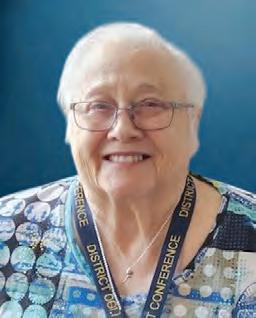

nephews. Sheila earned her bachelor’s degree from Arizona State University. She and Harold enjoyed attending cultural events including the Pittsburgh Symphony Orchestra, the Pittsburgh Broadway Series and the River City Brass Band. She was very active in fundraising for the American Cancer Society throughout western Pennsylvania for years. Sheila enjoyed many lunches and playing mahjong with dear friends. Family and friends gathered at Mount Lebanon Cemetery, 509 Washington Road, Mt. Lebanon, for services on Friday morning, June 27. In lieu of flowers, memorials may be made to the American Cancer Society. Arrangements by Laughlin Cremation & Funeral Tributes. laughlinfuneralhome.com
ORRINGER: Maxine Katz Orringer, age 70, passed away peacefully on the morning of Thursday, June 26, 2025. Beloved wife of the late Alan D. Orringer. Survived by brothers Lawrence Katz and Gerald (Cheryl) Katz and many countless friends and colleagues. Maxine was born in Uniontown, Pennsylvania, to the late Morris and Ruth Katz and went on to pursue both her undergraduate and graduate studies at the University of Pittsburgh, launching a remarkable career dedicated to helping others. Maxine worked at UPMC Children’s Hospital of Pittsburgh for 45 years. She was a pioneering force in the field of speech pathology. She not only practiced but also designed programs, taught countless students, and contributed innovative approaches that inspired others in her field. Her expertise led her to lecture at universities across the country, where she left a lasting impression on colleagues and students alike. Beyond her professional accomplishments, Maxine lived a life full of curiosity, creativity and compassion. She was an active member of the Three Rivers Rowing Association, finding joy and strength on the water. She also had a deep love for pottery, a craft she pursued with passion and artistry. Above all, Maxine cared deeply for children’s health and well-being — a cause that guided both her career and personal mission for nearly five decades. Maxine’s legacy lives on through the lives she touched, the students she mentored, and the many families she supported with kindness and dedication. Services were held at Ralph Schugar Chapel, Inc. Interment private. Contributions may be made to St. Judes Children’s Research Hospital (stjude.org), The Davis Phinney Foundation for Parkinson’s (davisphinneyfoundation.org) and The Parkinson’s Foundation of Western PA (pfwpa.org/). Arrangements entrusted to Ralph Schugar Chapel,Inc. schugar.com

POTASHMAN: Harvey Potashman, of Pittsburgh, passed away peacefully on June 26, 2025, at the age of 86. Born on November 23, 1938, to Rose and Meyer Potashman, Harvey began his career working alongside his father at the family grocery store, Meyer’s Market. In 1978, he and his brother, Jerome “Manny” Meyers, opened the first location of The Food Gallery, the first specialty foods supermarket in the Pittsburgh area. The business grew to five stores over the course of his career. Together
see Obituaries, page 20














In the Court of Common Pleas of Allegheny County, PA: No. GD 25 - 5055
In Re: Petition of Nancy Maureen Niemczyk for change of name to Nancy Anderson Niemczyk. To all persons interested: Notice is hereby given that an Order of said Court authorized the filing of said Petition and fixed the 30th day of July, 2025, at 9:30 a.m. as the time and the Motions Room, City-County Building, Pittsburgh, PA, as the place for the hearing, when and where all persons may show cause, if they have any, why said name should not be changed as prayed for. Thomas Pandaleon Esq., 684 Thomas Blvd., Pittsburgh, PA. 15208 TomPgh@aol.com
Obituaries:
Continued from page 19
with his beloved wife, Anita, who passed away in 1997, Harvey was a pillar of the Jewish community. As devoted members of Beth El Congregation, Harvey and Anita gave generously of their time and hearts. Their home was a center of hospitality, and their quiet leadership shaped synagogue life, Jewish education, Israel Bonds and many other charitable efforts. Harvey was the beloved brother of the late Sylvia Iwler and Jerome Meyers. He is survived by his children: Ilene (Steven) Cohen, Cheryl (Miles) Kirshner and Meyer (Michele) Potashman; and by his grandchildren: Daniel Cohen, Michal Cohen (Jordan Gibbs), Alex Kirshner (Molly Ellison), Joel Kirshner (Christina Im), Hannan Potashman and Amiel Potashman. Funeral services were held at Beth El Congregation of the South Hills. Interment Poale Zedeck Memorial Park Cemetery. The family welcomes donations to the Helene Weinstein Fund at Beth El Congregation. Arrangements entrusted to Ralph Schugar Chapel, Inc. schugar.com


Jewish Association on Aging gratefully acknowledges contributions from the following:
A gift from ... In memory of...
Faye Bleiberg
Faye Bleiberg . . . .
Sherwin E Glasser
Audrey Huber Z"L
Rushie Leff
Elaine McNeill
Jack & Bernice Meyers
Faye Nickel
Shirley E Preny
Shirley E Preny
Shirley E Preny
Eileen Snider & Family
Sharon Snider
Sophia Mallinger
.Anna Krantz
Harry Kurtz
.Isaac Glickman
.Mel Leff
Meyer Melnick
.Anne P. Meyers
Meyer Melnick
Sophia Mallinger
.Anna Krantz
Aaron Mallinger
Mildred Snider
.Mildred E Snider
Dr Susan Snider & Family . . . . .Mildred E . Snider
Yetta Speiser Z"L
Marc Tepper
Dr Irwin Wedner
Harriet Lee Siskind
.Gertrude Tepper
.Celia Wedner
Contact the Development department at 412-586-2690 or development@jaapgh.org for more information. THIS WEEK’S YAHRZEITS —
Sunday July 6: Helen K Davidson, Isaac Glickman, Marcella Cohen Goldberg, Edward W Harris, Morris L & Mary Ruth Jacob, Edith Liberman, Abe E Rosenfield, Lawrence Rudick, Jerome J Schwartz
Monday July 7: Miriam Bachrach, Mollie Harris Beck, Martin Bergad, Major Donald Broida, Anna R Fried, Sam Ginsburg, Meier Katzman, Emil Lebovitz, Mel Leff, Jacob Lerner, Sarah Litman, Charles J Loevner, Meyer Melnick, Rose Moritz, Jacob Rosenberg, Irving Siegel, Bessie Sigler, Josephine Silberman, Gertrude Stalinsky, Michael Joseph Wagner, Nathaniel I Walken
Tuesday July 8: Lawrence Brodell, Edythe G Canter, Maurice L Caplan, Benno Dreifuss, Pearl Evelovitz, Fannie Greenstein, Norman Halpern, Rose Janavitz, Saul Lundy, Verna Goldstein Plung, Beatrice Pollock, David Schwartz, Gussie Golda Snyder, Jacob Stern, Gus Whitman, Henry Wolk
Wednesday July 9: Mildred Caplan, Molvin Glantz, Harry A Jaskol, Isadore Joshowitz, Leah Lieberman, Morris M Markowitz, Bessie Miller, Rose C Myers, Minnie Shapiro, Paul Sigesmund, Cyril Simon, Bernard Stern
Thursday July 10: Jennie Baker, Ben Foster, Saul J Glick, Regina Goldberg, Rebecca Kaiserman, David Kaplan, Sarah Leebove, Henry Maengen, Louis Perr, Louis Roth, Harry P Schutte, Elmer M Sigman
Friday July 11: Anna Barnett, Dorothy F Caninzun, Sam Choder, Howard Roy Erenstein, Leo Finegold, Barnet Goldstein, Joseph Greenberger, Ruth Kuperstock, Hyman Martin, Bernard J Miller, Cecile Oring, Simon A Oskie, Sidney Posner, Daniel Pretter, David Serrins, Mildred E Snider, Irwin M Solow, Joseph Weinberger
Saturday July 12: Harry Finesod, Fannie Griglak, Freda Leff, Milton G Lehman, Pvt Ruben Lipkind, Rose Marcovsky, Marcus Benjamin Nadler, Harriet Lee Siskind, Meyer Spiro

SZKLINSKI: Lea Stander Szklinski, on June 26, 2025. Beloved wife of the late Abram Szklinski. Beloved mother of Harold Szklinski, Esther Karni Szklinski and Brian Szklinski. Beloved mother-in-law of Kathy Szklinski and Beth Sweet. Devoted sister of Fern Stander Moscov. Loving grandmother of Gregory and Paula Szklinski, Joshua Szklinski, Elad Karni, Yalon Karni, Itai Karni and Lydia Szklinski. Loving and beloved great-grandmother of Jackson and Charlotte Szklinski. Sister-in-law of he late Sarah and the late David Veledniger, Jerry Hellman and the late Molly Hellman, Miriam and the late Donald Krieger. Also survived by beloved nieces, nephews and cousins. Services and interment are private. Contributions may be made to Beth Shalom Preschool Scholarship Fund, 5915 Beacon Street, Pittsburgh, PA 15217. Arrangements entrusted to Ralph Schugar Chapel, Inc. schugar.com
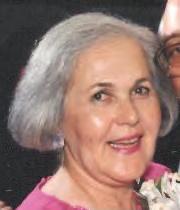
WEIKERS: On Tuesday, June 24, 2025, (Tillie) Ethel Rabinovitz Weikers, born on Dec. 5, 1932, peacefully passed away. She was predeceased by her beloved husband, Norbert Joseph Weikers, and her siblings Norman Rose and Helen Rabinovitz. She is survived by her beloved children, Rochelle Weikers Coleman (David) of Massillon, Ohio, Valerie Weikers of Pittsburgh and Ronald Neil Weikers (Ann) of Hilton Head, South Carolina; grandchildren Jessica Coleman, Rachel Coleman Ash (Andrew), Ethan Musser (Cali) and Claudia Musser; and great-grandchildren, Wilder Ash and Walker Ash. She is also survived by her beloved sister Ida Kopp as well as numerous beloved nieces, nephews, cousins and their families. She was particularly close with nieces and nephews David, Aileen, Randy and Paula (Simons) Rose, who lost their mother at a young age. Ethel was a nurse by profession and a loving caregiver to many of her close and extended family members. She was a contributing member of the Tree of Life Congregation Sisterhood and Pioneer Women. She loved the arts, music, dance and architecture. She loved animals, especially horses, birds and her beloved dog Pia Mater. She was everyone’s friend and she never lost her curiosity and desire to learn. Services were held at Ralph Schugar Chapel, Inc. Interment at Beth Shalom Cemetery. Contributions may be made to the Tree of Life Congregation or an animal rescue charity of the donor’s choice. schugar.com PJC





“How you think is as important as what you think.”









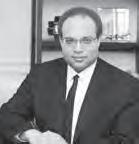





Smith-Rosenthal Team
Jason A. Smith & Caryn Rosenthal
Jason: 412-969-2930 | Caryn: 412-389-1695 Jasonasmith@howardhanna.com Carynrosenthal@howardhanna.com


Realtor













































By David Wiseman | JNS
On July 8, 2025, a new class featuring the likes of basketball’s Amar’e Stoudemire, judoka Oren Smadja, Paralympian Moran Samuel, swimmers Sarah Poewe and Helen Plaschinski Farca de Finkler, sports commentator Chris Berman and tennis legend Shahar Pe’er was to be inducted into the International Jewish Sports Hall of Fame.
Following Maccabi World Union’s postponement of the 2025 Maccabiah Games for a year, due to the war, the International Jewish Sports Hall of Fame (known as “the Hall”) followed suit and delayed its induction ceremony this year.
“Our board agreed to follow MWU’s lead and will also postpone the IJSHOF Induction Ceremony originally scheduled for July 8 to next summer,” it said in a statement.
The ceremony was destined to be a big event, not just for the inductees but also for the Hall itself. If you haven’t heard about the Hall, you could be excused for thinking it’s a brand new venture, but this isn’t the case. It’s a well-kept secret that has been around for more than four decades, during which it has inducted more than 500 Jewish athletes and sports personalities hailing from more than 30 countries.
The Hall’s vision is to recognize and celebrate Jewish contributions to sports through storytelling, advocacy and education. Some of the legends in Jewish sports already in the Hall include swimmers Mark Spitz and Lenny Krayzelburg, basketball’s Red Auerbach and Tal Brody, baseball star Sandy Koufax, windsurfer Gal Fridman and gymnasts Agnes Keleti and Aly Raisman.
Margolis and Silberman: The next generation
Founded in 1981 by Joe Siegman and Alan Sherman, the two held the reins until they both died. In need of fresh blood and new leadership, the torch was passed on to Jed Margolis and Pittsburgher Lenny Silberman, who are reinvigorating the Hall as well as public awareness of it.
The founder and CEO of Lost Tribe and with a lifetime of service devoted to JCC Maccabi and Jewish summer camps — incuding Emma Kaufmann Camp — Silberman is considered the right person to bring the Hall into the 21st century and connect with the next generations of Jewish kids in search of Jewish heroes.
Not only that, he’s in the Hall himself as the recipient of the Chairman’s Award of Excellence. Thanks to Silberman, the Hall now has a new website and revitalized social media presence.
“The Hall has all of these amazing stories, but very few people know about them, so I’m

here to help it rebrand, reposition, remarket and relaunch,” Silberman told JNS.
The induction ceremony was due to kickstart the Hall’s efforts but instead it will cap off a busy 12 months. “We will begin planning our virtual museum and also have an event in South Florida to celebrate past honorees,” Silberman said. “We will also begin the process of selecting a new class for 2026. And finally, we are looking to do a virtual celebration early this fall for the classes of ’23, ’24 and ’25.”
Margolis has a similarly storied career and worked for more than 40 years professionally in JCCs and Maccabi USA, where he served as executive director for 17 years, before retiring in 2017.
“What we’re trying to do here is to educate, motivate, celebrate, and inspire Jewish athletes around the world,” Margolis told JNS. “While we are often called the ‘People of the Book,’ we are equally the ‘People of the Story’—and the stories of Jewish athletes are powerful, courageous and deeply moving. From world champions to record breakers and pioneers who changed the game, their legacies speak volumes.”
He added, “Our work also plays a vital role in confronting antisemitism by highlighting the enduring strength and contributions of the Jewish community through sport.”
Making the Hall global and accessible
Part of the vision of Silberman, Margolis and their new board of directors is to make the Hall truly international and less “American/Israeli-centric.” In this, they are succeeding and recent inductees have come from Denmark, Scotland, Argentina, New Zealand and a first-ever from Mexico.
The Hall’s physical presence will move from the Wingate Institute in Netanya to Kfar Maccabiah in Ramat Gan, but more than that, it will have a strong online presence so that people all over the world can visit it whenever they want.
“There will be a virtual museum that is open 24/7 every day of the year,” Silberman promised. “We want people to come and visit it and gain access to the exciting and incredibly inspiring stories our inductees tell.”
Margolis and Silberman said they want everyone who is Jewish to feel invested in the Hall, noting that anyone is able to

The Hall’s think tank
A think tank to discuss the future of the Hall was scheduled to take place the day after the induction ceremony. The aim was to find new ways to collaborate, especially in light of events following the Hamas massacre on Oct. 7, 2023. It too has been postponed due to the Israel-Iran war.
“We plan to continue with the think tank, most likely sometime next month (July),” Silberman said.
A critical agenda item for the think tank will be tackling antisemitism and Jew-hatred, emphasizing sports’ ability to foster Jewish pride and counter these challenges, Silberman and Margolis said.
“We envision using sports as a platform to educate and inspire Generations Z and Alpha,” Silberman said. “By leveraging social media, we aim to highlight our rich history and promote strength within the Jewish community in sports and leadership roles.”
Silberman and Margolis have a range of impressive ideas and have already mapped out a strategic vision related to the development and future growth of the Hall.
“We’d love to have something like regional ceremonies all over the world so people can enjoy this once-in-a-lifetime experience in front of their family and friends without having to travel,” they said.
Additionally, they are looking to enhance the global board they have assembled to oversee the Hall.
If the duo can get to the finish line with its ambitious plans, the Hall will be far more than just a stagnant museum honoring the past. Rather, it could inspire the Jewish sporting superstars of tomorrow to join them in the pantheon of the greatest Jewish athletes of all times. PJC
A first and blast
Chabad of the South Hills hosted its first South Hills Jewish Festival. The June 22 event featured live music, a petting zoo, kosher food and family-friendly activities.


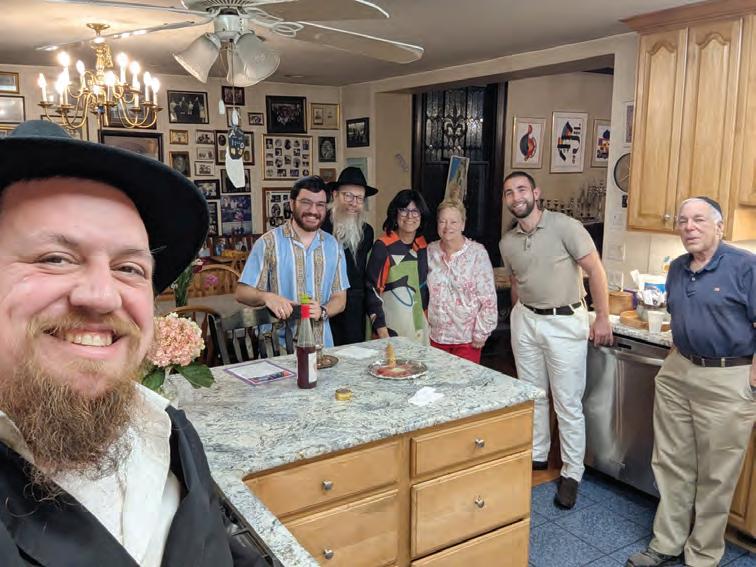



Sunday, August 3Friday August 8
• Volunteers must be 18 or older
